News articles are listed in reverse order of publication.
Sukhmani Kaur Mantel, ARUA Water CoE, Institute for Water Research
Nature-based solutions (NbS) are actions to protect, sustainably manage, and restore natural and modified ecosystems that address societal challenges effectively and adaptively, simultaneously benefiting people and nature. NbS go beyond, and complement, land restoration for stemming the loss of biodiversity and ecosystem services, through the incorporation of nature-conscious design principles. These solutions enhance the availability of water, improve water quality and reduce risks of water-related disasters (United Nations World Water Development Report 2018: Nature-Based Solutions for Water; https://www.unwater.org/publications/world-water-development-report-2018).
Rhodes University, through the Institute for Water Research (IWR), has been awarded a three-year grant titled “Nature-based solutions for African Climate Resilience”, under the Erasmus+ call for Capacity Building for Higher Education (https://erasmus-plus.ec.europa.eu/news/results-2023-capacity-building-for-higher-education-call). The project’s overall objective is to enhance the capability of future professionals (current students) and of current environmental specialists and engineers (through professional development courses) for facilitating climate resilience in Africa. As a first step, the project focuses on promoting NbS in Higher Education Institution (HEI) curricula, which aligns with Rhodes University Institutional Development Plan’s focus on research and postgraduate students (https://www.ru.ac.za/media/rhodesuniversity/content/institutionalplanning/documents/Rhodes_University_IDP2023-2028_final.pdf). NbS is also high on the agenda of the EU (Green Deal), Africa (Agenda 2063 for Africa's Development: The Africa We Want) and national (climate) policy documents in Senegal and South Africa. Considering the need to build capacity for these solutions in Africa, the project goes beyond university curricula in HEIs and responds to the need of building capacity of actors who are an intricate part of the design, development and implementation of resilient infrastructure. We will work with civil engineers (the designers) and environmental scientists (the gatekeepers) of infrastructure development.
Designing and implementing inclusive NbS requires specific knowledge and new approaches with close involvement of all stakeholders. This means that we need to train engineering students in new ways and equip professionals with new insights and skills. To this end, the project will result in:
To ensure that the project is cognisant and inclusive of the needs of the local beneficiaries and stakeholders, these stakeholders will be involved from the start in co-designing the educational program. HEI stakeholders (including students, alumni, University administrators, government department representatives responsible for higher education) will be surveyed at the start of the project. So, be on the lookout for further communication and request for participation. If you would like to reach us, please contact Sukhmani Mantel (s.mantel@ru.ac.za) and Margaret Wolff (m.wolff@ru.ac.za).
The project consortium consists of two universities in South Africa (Rhodes University and University of Cape Town [UCT]), two universities in Senegal (Ecole Polytechnique of Thies [EPT] and Université Cheikh Anta Diop [UCAD]), and three partners in the EU: TÜ Delft (Netherlands), AgroParisTech (France) and Institut National de Recherche Pour L’Agricuture, L’alimentation et L’Environnement (INRAE, France). The project will also build upon the African Research University Alliance (ARUA) Water Centre of Excellence (CoE; https://www.ru.ac.za/iwr/centers/aruacoe/) and African Water Resource Mobility Network (AWARMN; https://www.ru.ac.za/intra-africa-awarmn/) for sharing knowledge. The project envisages both North-South and South-South knowledge exchange and African contextualisation to ensure students and professionals are exposed to courses that incorporate transdisciplinary approaches with high standards of knowledge base, teaching and assessment methods, and quality assurance. This, we believe, is an important strategy to not only combat the impacts of climate change, but also to stem brain drain and migration out of Africa.
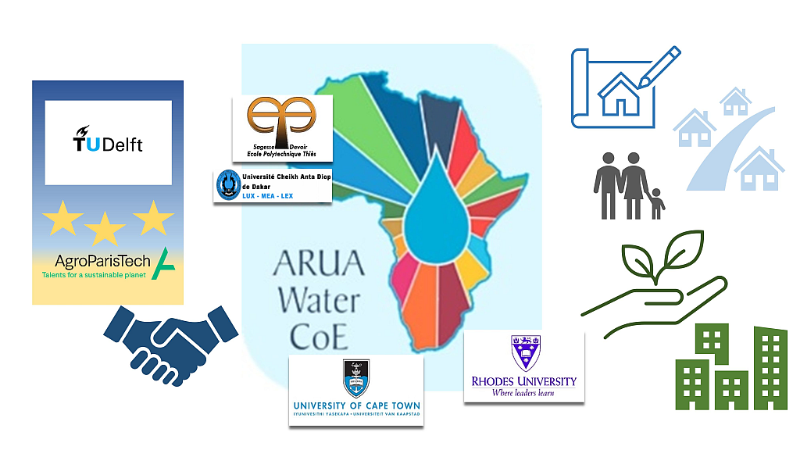
Sukhmani Kaur Mantel, ARUA Water CoE, Institut de Recherche sur l'Eau
Les solutions basées sur la nature (SbN) sont des actions pour protéger, gérer durablement, et restaurer les écosystèmes naturels et modifiés qui répondent efficacement et adaptativement aux défis sociétaux, tout en bénéficiant simultanément aux personnes et à la nature. Les SbN vont au-delà, et complètent, la restauration des terres pour endiguer la perte de la biodiversité et des services écosystémiques, par l'incorporation de principes de conception respectueux de la nature. Ces solutions augmentent la disponibilité de l'eau, améliorent la qualité de l'eau et réduisent les risques de catastrophes liées à l'eau (Rapport mondial des Nations Unies sur la mise en valeur des ressources en eau 2018: Solutions Basées sur la Nature pour l'Eau; https://www.unwater.org/publications/world-water-development-report-2018).
L'Université de Rhodes, par le biais de l'Institut pour la Recherche sur l'Eau (IWR), a reçu une subvention de trois (3) ans intitulée « Solutions basées sur la nature pour la Résilience Climatique en Afrique », dans le cadre de l'appel Erasmus+ pour le Renforcement des Capacités pour l'Enseignement Supérieur ( https://erasmus-plus.ec.europa.eu/news/results-2023-capacity-building-for-higher-education-call). L'objectif global du projet est de renforcer les compétences des futurs professionnels (étudiants actuels) et des spécialistes et ingénieurs environnementaux actuels (par le biais de cours de développement professionnel) pour faciliter la résilience climatique en Afrique. Dans un premier temps, le projet vise à promouvoir les SbN dans les programmes d'enseignement supérieur (HEI), ce qui est en accord avec le Plan de Développement Institutionnel de l'Université de Rhodes qui met l'accent sur la recherche et les étudiants en post-graduation ( https://www.ru.ac.za/media/rhodesuniversity/content/institutionalplanning/documents/Rhodes_University_IDP2023-2028_final.pdf). Les SbN sont aussi une priorité pour l'Union Européenne (Green Deal), l'Afrique (Agenda 2063 pour le Développement de l'Afrique : L'Afrique que Nous Voulons) et dans les documents politiques nationaux (climat) au Sénégal et en Afrique du Sud. Considérant le besoin de construire des capacités pour ces solutions en Afrique, le projet va au-delà des programmes universitaires dans les HEI et répond au besoin de renforcement des capacités des acteurs qui font partie intégrante de la conception, du développement et de la mise en œuvre d'infrastructures résilientes. Nous travaillerons avec des ingénieurs civils (les concepteurs) et des scientifiques environnementaux (les gardiens) du développement des infrastructures.
La conception et la mise en œuvre de SbN inclusives nécessitent des connaissances spécifiques et de nouvelles approches avec la participation active de tous les intervenants. Cela signifie que nous devons former les étudiants en ingénierie avec de nouvelles approches et doter les professionnels de nouvelles perspectives et compétences. À cet effet, le projet aboutira à :
Pour garantir que le projet prend en considération et inclut les besoins des bénéficiaires et des parties prenantes locales, ces derniers seront impliqués dès le début dans la co-conception du programme éducatif. Les parties prenantes des établissements d'enseignement supérieur— les étudiants, les anciens élèves, les administrateurs universitaires, les représentants des ministères responsables de l'enseignement supérieur— seront interrogées au début du projet. Soyez donc à l'affût pour de plus amples communications et demandes de participation. Si vous souhaitez nous contacter, veuillez écrire à Sukhmani Mantel (s.mantel@ru.ac.za) et Margaret Wolff (m.wolff@ru.ac.za).
Le consortium du projet est composé de deux universités en Afrique du Sud (Université de Rhodes et Université du Cap [UCT]), deux universités au Sénégal (École Polytechnique de Thiès [EPT] et Université Cheikh Anta Diop [UCAD]), et trois partenaires dans l'UE : TÜ Delft (Pays-Bas), AgroParisTech (France) et l'Institut National de Recherche Pour l’Agriculture, l’Alimentation et l’Environnement (INRAE, France). Le projet s'appuiera également sur le Centre d'excellence sur l'eau (CoE ; https://www.ru.ac.za/iwr/centers/aruacoe/) de l'Alliance des Universités Africaines de Recherche (ARUA) et sur le Réseau africain de mobilité des ressources en eau (AWARMN ; https://www.ru.ac.za/intra-africa-awarmn/) pour le partage des connaissances. Le projet envisage des échanges de connaissances Nord-Sud et Sud-Sud et une contextualisation africaine pour assurer que les étudiants et les professionnels sont exposés à des cours qui intègrent des approches transdisciplinaires avec des normes élevées de base de connaissances, de méthodes d'enseignement et d'évaluation, et d'assurance qualité. Cela, nous le croyons, est une stratégie importante non seulement pour combattre les impacts du changement climatique, mais aussi pour endiguer la fuite des cerveaux et la migration hors d'Afrique.
Last Modified: Fri, 13 Oct 2023 09:50:26 SAST
By Rebecca Powell with inputs from the Tanzania Node team, 23-03-2023
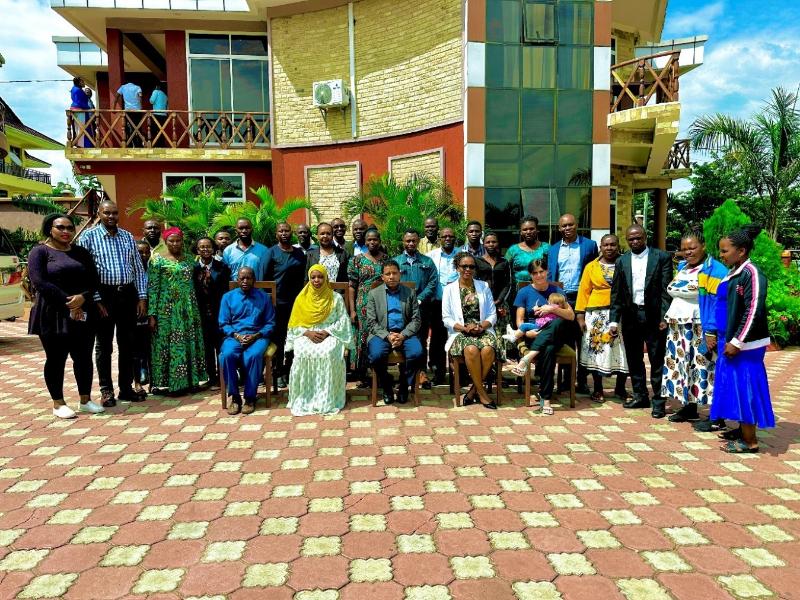
Figure 1: The Tanzania SAM Workshop Participants at Iringa, Mount Royal Villa Hotel in the Rufiji Basin.
The Tanzania University of Dar Es Salaam (UDSM) team, a Node partner of the ARUA Water CoE: Resilient Benefits Project, held a 1-day Strategic Adaptive Management (SAM) Workshop, on 10 March, 2023. The workshop was held with 25 key stakeholders of water resources use and management in the Great Ruaha River Basin, a sub-basin of the Rufiji Basin located in south-eastern Tanzania (Figure 1). The goal of the workshop was to continue work started with the same group of stakeholders in 2022, in continuing the co-creation of objectives and achievable actions towards achieving the vision of greater participation and equity in water resources management in the Ruaha sub-basin. The workshop was held at Mount Royal Villa Hotel in the Iringa town, in the foothills of the Rufiji Basin. The stakeholders who attended the workshop included small scale subsistence farmers, large scale commercial farmers, Tanzania electricity supply company linked to hydropower schemes in the catchment, private estates, NGOs such as World Wildlife Fund, Government water basin managers and representatives from the Ruaha National Park (the ecosystems representatives).
The stakeholders who attended the workshop all face the problem of contestation around fair and equal water allocation and the issuing of water use permits amongst different users. For example, large scale commercial farmers have attributed declining flows in the Ruaha River in recent years to illegal water abstractions by local subsistence farmers. There are numerous large hydropower schemes that have been built and are destined for the catchment and these have considerably altered the consistency and seasonality of water flows in the Ruaha River. Declining water availability is a concern for food production in the Basin, which is considered one of the ‘bread-baskets’ of Tanzania.
The SAM workshop was a success in that it provided a space for facilitating open dialogue around these issues, with specific actions identified by stakeholders. Researchers from the UDSM team (Gift Mollel, Timotheo Ndimbo and Ramadhani Twaha) discussed their research findings in relation to the vision, presenting key information that could support decision making. Open and comfortable dialogue amongst the stakeholders was carefully facilitated by the Tanzania UDSM team (Dr Mathew Senga, Prof Joel Nobert, Dr Augustina Alexander and Dr Deogratius Mulungu), who mixed the stakeholders in groups where small water users could engage with larger water users and with water resource managers and / or NGOs. The Tanzanian team used techniques such as games, actively inviting stakeholders to speak out (Figure 2), and asking the groups to draw and write down their thoughts, knowledge and interests in equitable water resources management (Figure 3). In the morning session, members of the various stakeholder groups mapped their location and role in water resource use and management in the Ruaha, and identified how they are connected to other stakeholders in the vicinity of their area of influence. Following this, the stakeholders then identified a few key objectives under the vision of equitable and participatory water resources management, that they felt they could contribute to. They listed doable actions they could take up over the next year towards achieving the objectives. The UDSM team placed pressure on the stakeholders to identify leaders to take the various actions forward.
One concern raised at the end of the workshop was the continuity of this process of strategic and adaptive planning and doing together. Would those who listed an action in the workshop really take the work forward? The issue of lack of funds to continue the process of collective work was raised but there was agreement that, existing institutions such as the Ruaha catchment committees and the Rufiji multistakeholder forums, are viable avenues for continuing SAM. The UDSM team is also writing funding proposals with the ARUA Water CoE team, to continue their role of facilitating SAM in the Ruaha.
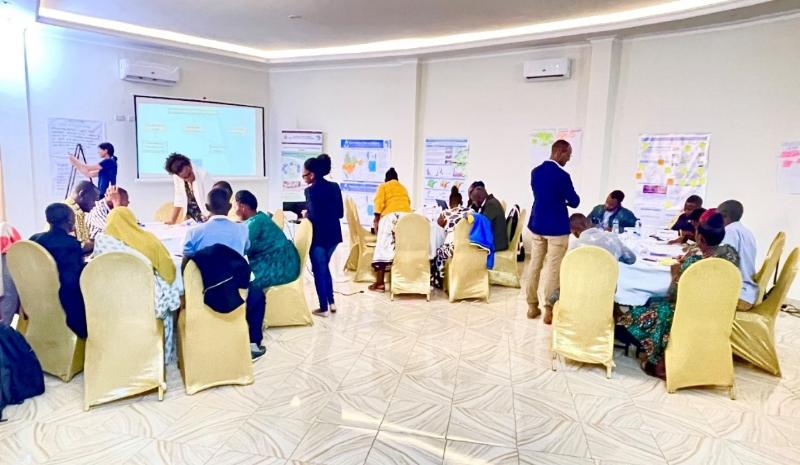
Figure 2: Facilitator, Dr Augustina Alexander, Timotheo and Gift from UDSM actively engaging with stakeholder groups at the workshop to ensure they all feel comfortable to contribute
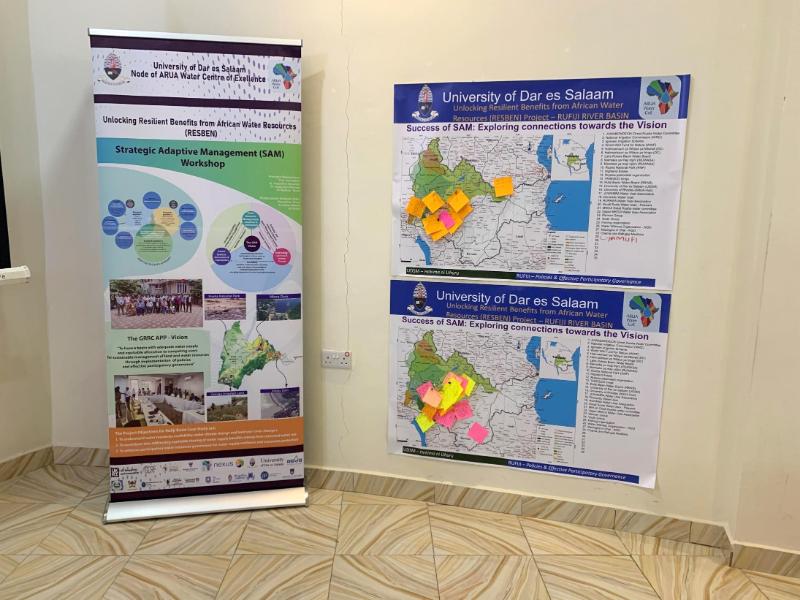
Figure 3: The Ruaha River Basin map with sticky notes from stakeholders listing their role and interests in water resources management
Last Modified: Mon, 29 May 2023 14:34:02 SAST
By Rebecca Powell and Sofia Lazar, Institute for Water Research at Rhodes University
The ARUA Water Centre of Excellence (CoE), with its Hub at Institute for Water Research, Rhodes University, held a ‘RESBEN Research Webinar’, on February 28th, 2023. This online event had the purpose of sharing key findings of engaged water-related research that has taken place across seven African case studies countries over the last 2 years, under the RESilient BENefits for African Water Resources (RESBEN) project. The RESBEN project is funded by the UK Research and Innovation (UKRI) Global Challenges Centre Research Fund (GCRF). The project has been applying the Adaptive Systemic Approach (ASA), an innovative participatory methodology at the nexus of water resources research and management policies and practice. Transdisciplinarity and community-engaged research are critical components of the ASA approach, for enabling transformation. In this way, the project seeks to alter water development practice towards achieving Sustainable Development Goals (SDGs), by working on water availability and pollution, as the two key water development priorities in Africa. The webinar provided an opportunity for the researchers of the case studies (Nodes) from Senegal, Tanzania, Nigeria, Uganda, Ethiopia, Rwanda, and South Africa, to reflect on the key lessons of applying the ASA to shift water allocation and pollution related challenges (see Figure 1). The audience was not only limited to the ARUA Water CoE team and African Node researchers but included other colleagues from outside of the RESBEN project, African-based NGOs working in the environmental and water sector, and the South African Environmental Observation Network. This brought the number of participants to 56, spanning well beyond our project team.
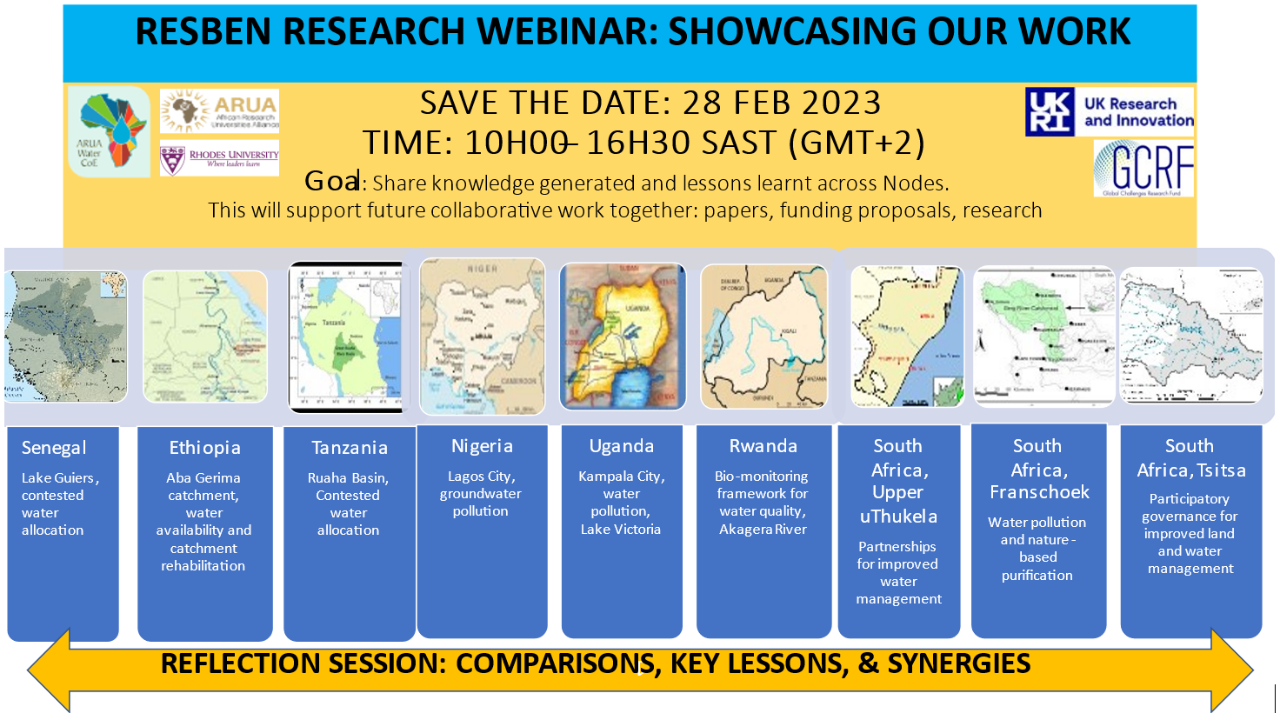
Prof Isa Kabenge (Uganda, Makerere), the co-director of the ARUA Water CoE, opened the webinar, highlighting the importance of the event for reflecting on the similarities and differences in the way the various Nodes have researched and attempted to ‘shift’ similar water-related challenges. The morning session, chaired by Dr Djim Diongue from Senegal, included research findings from Lake Guiers, Senegal; the Upper Blue Nile Basin in Ethiopia and the Ruaha Basin (part of Rufiji Basin) in south-eastern Tanzania. Each of these African Node teams focused on issues of water resources allocation and access that is safe and equitable. The afternoon session, chaired by Dr Prossie Nakawuka from Uganda, focused on issues of water pollution and impacts on local communities in two African cities - Lagos City (Nigeria) and Kampala City (Uganda). Also in this session, the Rwanda Node presented a different focus, having worked in the Akagera River with local government and community stakeholders on the development and potential uptake of a biomonitoring system to indicate river health. The final component of the webinar was a 1-hour reflection session facilitated by Prof Vanessa Speight, a research advisor from Sheffield University on the Water CoE team. This session produced some critical reflections on the similarities and differences between the various case studies in relation to research findings. Examples of feedback from the participants on these reflections include:
‘Mostly natural/biophysical scientific research with some efforts to use participatory methods and paying some attention to power dynamics and inequalities.’ (a commonality)
‘The question of contested water scarcity - in terms of quantity and quality is common.’
‘Challenges in moving from the collective action stage enabled through the APP (adaptive planning process) to traction in the institutional space (e.g. getting key gov buy-in/participation).’ (a commonality)
‘Context in each of the nodes is really different and the relationships that are already established meant some nodes could work more easily.’
‘I can see a difference in the depth at which the node leaders and researchers understand power relations. This also applies to the hub.’
The Nodes also reflected on learnings from applying the ASA to potentially shift the water-related challenges in their respective case studies. Some insightful reflections were offered, including for example:
‘The ASA is bridging the gap between researchers and stakeholders at different levels.’
‘Are academics/universities the best to be leading ASA/partnership activities? Good to be able to bring the scientific knowledge but it is not their main function.’
‘The ASA has taught researchers to be able to translate their research findings in a way that stakeholders at various levels can understand.’
‘The ASA process pushed researchers to think about how their research could contribute to addressing real problems experienced by stakeholders.’
The overall conclusion from the webinar discussions, was that the ASA is a useful methodology for enabling transdisciplinary and participatory research that, given sufficient time (i.e., more than 3 years of a project lifetime) and consistent application of the core underlying principles, has a strong potential to shift water challenges in Africa. In this regard, the webinar prompted two key actions that are being taken forward for 2023:
Last Modified: Mon, 29 May 2023 14:34:01 SAST
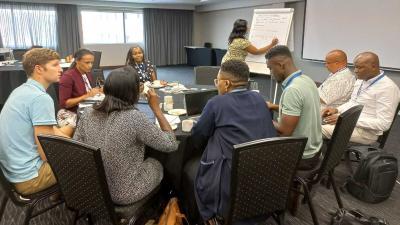
Drs Prossie Nakawuka (Makerere University, Uganda), Rebecka Henriksson (UKZN), Bukho Gusha (RU) and Matthew Weaver (RU) from the ARUA Water Centre for Excellence attended the Carnegie Corporation of New York (CCNY)-funded Early Career Researcher (ECR) Meeting in Pretoria. The weeklong event brought ±80 ECRs from more than ten African countries to collectively engage on some of the world's most pressing problems.
The meeting was designed to enable experiential learning and structured to balance ECR skills development sessions, informative talks and discussions, networking and mentor-led thematic working group sessions. The working groups were required to develop and present a realistic concept note addressing a particular problem theme taking a transdisciplinary approach. Grand challenges that working groups and mentors focussed on included Social well-being and improved quality of life (Prof. Valerie Møller), One Health (Prof. Wanda Markotter), Sustainable food systems and nutrition (Prof. Edward Nesamvuni), Energy transition (Prof. David Walwyn), Climate change and ecological biodiversity (Prof. Abel Ramoelo), and Transdisciplinary data science (Prof. Vukosi Marivate).
Prossie, Rebecka and Matthew participated in the Sustainable food systems and nutrition working group. They developed a concept note proposing the development of a food systems analytical framework that foregrounds culture as a key metric to understand and transition African food systems towards sustainability. Their mentor, Prof. Edward Nesamvuni, is excited by their novel framework and is committed to securing funding to see the concept note developed into a comprehensive proposal in 2023.
Bukho participated with colleagues in the Climate change and ecological biodiversity working group. They developed a concept note to explore biodiversity loss in the Inkomati-Usuthu catchment management area. Their mentor, Prof. Abel Ramoelo, is supporting their concept, and building upon it through identifying other case study areas in Southern Africa to better understand biodiversity loss. The group plan to develop a positioning paper describing the biodiversity drivers and impacts in the Inkomati-Usuthu River catchment.
Other insightful discussions facilitated during the week, each full of insights and resources to draw upon, included:
Despite the gruelling program, we all engaged with energy and rigour. We left with heads full of ideas, connections to follow up on and resources to tap into. If you are an ECR and ever have the opportunity to participate in an event like this, JUMP ON IT!
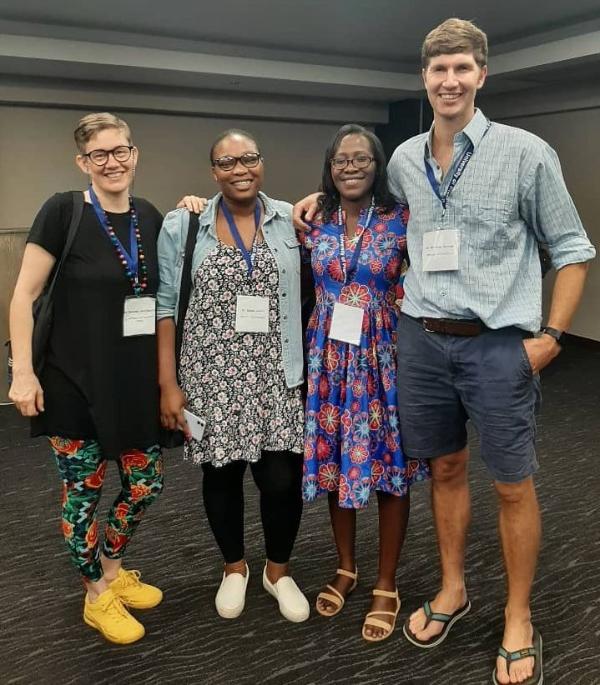
Written by Matthew Weaver, Rebecka Henriksson, Bukho Gusha and Prossie Nakawuka
Last Modified: Tue, 11 Apr 2023 09:52:25 SAST
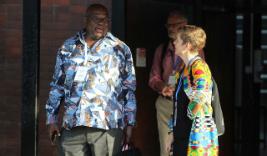
Mrs Margaret Wolff and Dr Rebecka Henriksson attended the ARUA Centre Directors meeting that took place in Mauritius on 23rd and 24th February 2023.
The meeting brought together the Centre Directors and Managers of the 13 ARUA Centres of Excellence, hosted by the University of Mauritius. It was an opportunity for the Secretary-General of ARUA, Professor Ernest Aryeetey, to present feedback to the directors on the various activities that ARUA has been involved in over the past 12 months. This included, specifically, the continued negotiations with The Guild network of European universities to form Clusters of Excellence between ARUA and The Guild universities. The meeting also included discussions about the expectations of the CoEs and the responsibilities of both ARUA and the universities hosting the centres, as well as conversations about establishing joint Doctorate programmes between CoEs.
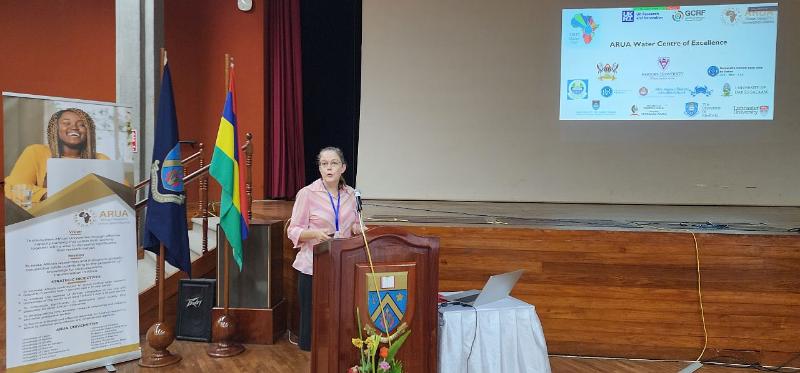
Each Centre was given a chance to present a self-assessment including achievements, challenges and future plans to share with ARUA and the other Centres. Day two saw the Water CoE presenting on the work undertaken in the last three years. The Centre was praised for their work and the large number of ARUA universities they are working closely with, i.e. the Water CoE nodes. Margaret spoke about the successes and challenges and it was clear that many of the challenges mentioned by the Water CoE are similarly faced by the other Centres. The most common challenge was the funding for the Centres after the end of the current project funding cycle from UKRI. The successes of the Water CoE highlighted, included multiple activities with the eight Water CoE nodes, the series of stakeholder engagement workshops held in the seven countries and the publication of two papers by research assistants funded by the UKRI Research Excellence and Capacity Development Grants.
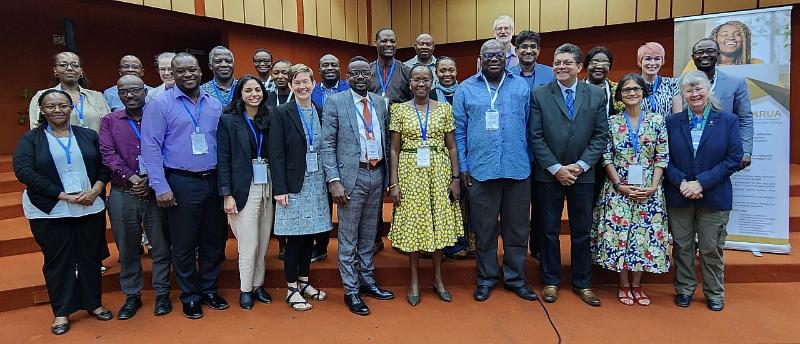
The meeting provided an excellent opportunity for the Centre Directors and Managers to meet in person, learn from one another’s unique experiences and skills, and to discuss future collaboration ideas.
By Margaret Wolff and Rebecka Henriksson
Last Modified: Wed, 01 Mar 2023 15:21:08 SAST
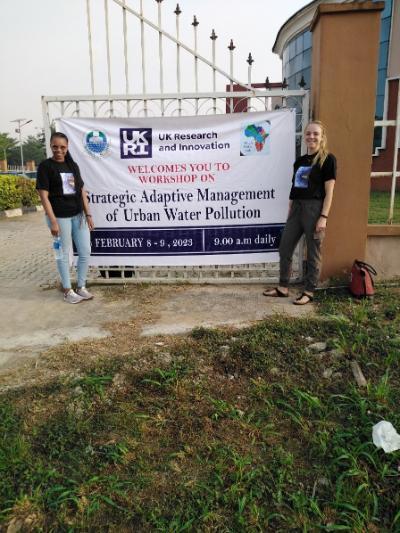 Dr Nolusindiso Ndara from Rhodes University (left) and Ms Emily Nicklin from University of Cape Town (right) attending the SAM workshop in Lagos, Nigeria.
Dr Nolusindiso Ndara from Rhodes University (left) and Ms Emily Nicklin from University of Cape Town (right) attending the SAM workshop in Lagos, Nigeria.A team from Rhodes University’s Institute for Water Resources (IWR) recently travelled to Nigeria to participate in a workshop on the Strategic Adaptive Management (SAM) of urban water pollution in the Lagos community of Ilaje Bariga. The workshop was held on the 8th and 9th of February at the University of Lagos, bringing together stakeholders from local government, NGOs, schools and local communities to develop a collaborative action plan to address the city's growing water quality challenges.
The workshop was informative and insightful, and it gave a chance for stakeholders to build relationships, hear one another's viewpoints, and collaborate in the management of Lagos’s urban water pollution challenges. Rhodes’ IWR hopes to continue their collaboration with the University of Lagos at future workshops.
Written by: Nolusindiso Ndara
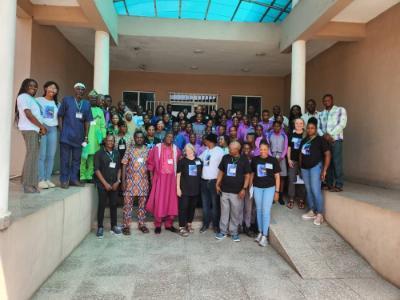 The Lagos team and participants at the SAM workshop, February 2023.
The Lagos team and participants at the SAM workshop, February 2023.Last Modified: Mon, 27 Feb 2023 16:49:43 SAST
The launch of the PERKA (Peer-Learning for Emerging Researcher’s Knowledge and Advancement) report was held as part of the meeting on ‘High-level Convening on Early-career Researcher Development in the Post-PhD Phase’ on 6-7 December 2022 in Cape Town. Dr Sukhmani Mantel (Academic Manager, ARUA Water CoE) was one of the invitees to the event. The two-day programme included keynote presentations, panel discussions, and facilitated conversations on designing, implementing, funding, and monitoring interventions that support early-career researchers (ECRs). Also of interest were case studies from programmes successfully implemented in recent years.
The PERKA project was a joint participatory research programme that was funded jointly by the Carnegie Corporation of New York (CCNY) and the National Research Foundation (NRF) of South Africa, with implementation by the Centre for the Advancement of Scholarship at the University of Pretoria, South Africa.
The launch of the report included a set of guidelines for designing impactful post-PhD support programmes in Africa. These provide guidance for and share the experiences of African programmes in implementing such initiatives, describe partnership models for funding, and provide action points and recommendations for enhancing post-PhD support across the continent.
The keynote address by Prof. Ernest Aryeetey, titled ‘Early Career Researcher (ECR) Development in Africa’, focused on some lessons learnt from the African Research Universities Alliance (ARUA) experience. The address highlighted that ARUA was designed to answer the question of how higher education institutions in Africa can become globally competitive through greater internal research capacity that addresses the challenges faced by the continent.
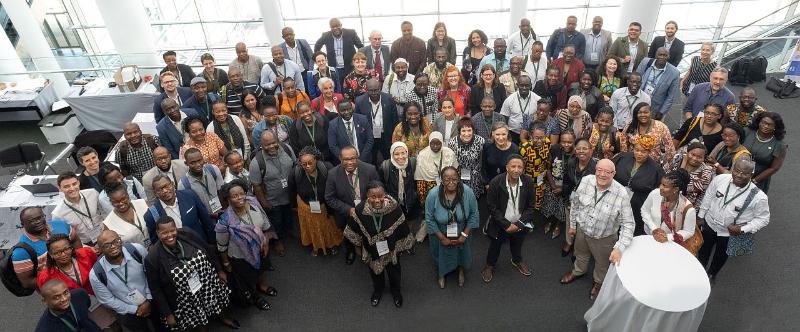
The event presented an opportunity to learn from the case studies and the research as to what works in the African context, considering that the landscape of Higher education institutions is much different with high student-staff ratio, limited number of academics with PhDs, and the fact that ECRs do not receive adequate attention. ECRs can be a key to addressing some of these challenges as they can boost research and innovation in Africa through publishing, supervision and supporting teaching.
Case studies from across the continent, including UCT-DEAL, CARTA, BAGA-Africa, FSNET-Africa highlighted how context-specific programmes are being successfully designed across Africa, and that retention (which includes capacity building of postdocs in science communication, project management and mentorship) of these future academics should be an important focus for Universities.
Dr Sukhmani Mantel
Last Modified: Tue, 24 Jan 2023 14:17:02 SAST
Fourteen years ago (in 2009), Ahmed Amoo Yinusa gained admission into the University of Lagos (UNILAG) as an undergraduate at the Department of Mechanical Engineering. He finished as the second-best student in the department with a first class final SGPA of 5.00/5.00 and a CGPA of 4.76/5.00 in 2014. He chose lecturing at UNILAG because he always loved to learn new things, impart knowledge, do research and publish. So, in 2016, he was appointed by the University of Lagos to work as a Graduate Assistant in the Department of Mechanical Engineering and obtained his Masters in the same department with a Distinction (CGPA of 4.90/5.00) in 2017.
He became a Registered Mechanical Engineer and a PhD candidate in 2018/2019. During his Ph.D. program, he was nominated by the University of Lagos, Akoka to represent the University in Grenoble, France on smart energy and nanotechnology under the sponsorship of the French embassy in Nigeria and came back with a diploma in climate change and another diploma in French A1.
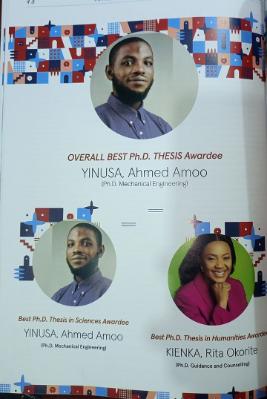
He defended his thesis (with thesis title - Nanofluidic-flow induced vibrations of single and multi-walled branched nanotubes resting on Winkler-Pasternak foundations in a thermal-magnetic environment) in December 2022 which came out to be, not just the best PhD thesis in sciences but also the overall best PhD thesis. The training he has acquired, and the quality of his Ph.D. have helped him to have over one hundred (100) publications with over ten (10) strictly emanating from his Ph.D.
The nanotechnological and FabLab experiences gathered during his Ph.D. can be adopted to create solutions capable of enhancing water quality which is a major area currently being investigated by the ARUA Water CoE research group. He is a member of HERZER research group, Climate change research group, UNILAG FabLab, ARUA water research group and Cold chain research group. Furthermore, He is blessed with a beautiful wife (Anifat) and lovely children (Adam, Hikmat, Ameedat and Alim). Finally, He has traveled to Grenoble (France), Nairobi (Kenya) and Ouagadougou (Burkina Faso) on his research and has had the opportunity to attend trainings, conferences and meet so many interesting people.
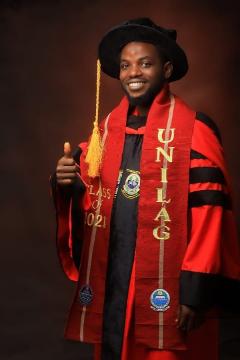
Last Modified: Thu, 26 Jan 2023 10:09:49 SAST
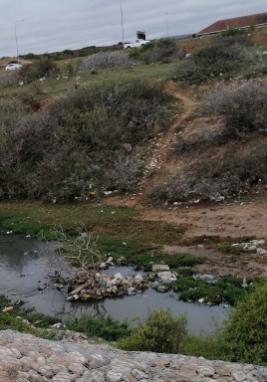
Two water researchers at South Africa’s Rhodes University, Rebecca Powell and Sukhmani Powell say storytelling can be a powerful way to share scientific research with non-expert audiences- and in their case, it has proven to be a powerful tool to share water related research content with the ordinary man on the ground.
They trained ten early career researchers from six African countries – Senegal, Tanzania, Nigeria, Uganda, Rwanda, and South Africa – about digital storytelling. All the participants study some aspect of water, such as pollution, allocation and access. The results they say were positive.
Listen to the radio interview on Channel Africa – The Upside with Dr Rebecca Powell.
Text written by Channel Africa – The Upside
Last Modified: Thu, 15 Dec 2022 14:49:44 SAST
An Adaptive Planning Process (APP) workshop was held under Uganda's Unlocking Resilient Benefits from African Water Resources (RESBEN) Project on the 4th of August 2022. The workshop forms part of a series of workshops that are being held in many other African countries, including Tanzania, Rwanda, and Ethiopia. In preparation for the workshop, the Water Centre of Excellence (ARUA Water CoE) Hub team at Rhodes University sent Dr David Gwapedza and Ms. Naledi Chere (UCT) to Uganda to support the workshop's preparation and running.
Two days were set aside for workshop preparation. During the rehearsal, Dr Gwapedza and Ms. Chere took the Ugandan node team through the various APP stages using the APP booklet. Once everyone was up to date with the APP principles of facilitating a workshop, the team moved to finalise the day's program. Each step of the day's agenda was deliberated in detail, and facilitators were chosen. The program planning was a fun activity because the Ugandan team were very motivated, and lots of light moments accompanied by laughs that we shared from time to time.
On the morning of the 4th we woke up early and proceeded to the meeting venue, conveniently located at the same hotel where we stayed. At that time, the room had been well prepared and decorated by the hotel staff. Figure 1 shows the beautiful room set-up.
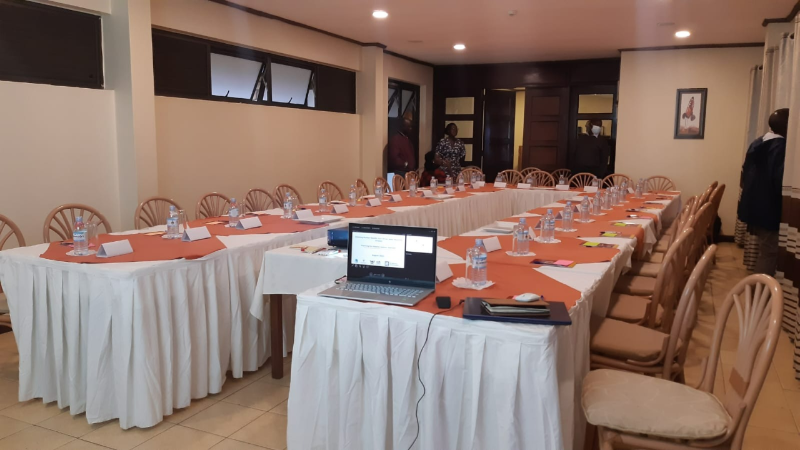
Figure 1: Ugandan APP room set-up.
At 8 am, the guests began trickling in; the team was apprehensive that the attendance may be low and started messaging some stakeholders to remind them to attend. Fortunately, most stakeholders confirmed that they were on their way. The workshop got underway with almost full attendance. In attendance was a mix of stakeholders, including residents, vendors, fishermen, NGOs, representatives from state agencies and tribal authorities. It is a tradition in Uganda that senior-ranking officials from the government and tribal leaders are introduced. However, as this could upset the balance in power relations, Prof Isa Kabenge spent some time negotiating with some senior ranking officials until they agreed that introductions will only be done at the end.
The Ugandan team conducted the workshop facilitation and demonstrated very good facilitation skills. Figure 2 shows Prof. Byaruhanga facilitating a session on STEEP. Notably, the workshop was mostly conducted using the local language. Although this provided some translation challenges, it provided light moments as stakeholders sometimes joined in the translation "debates" that sought to find the most appropriate translations. It was a very relaxed atmosphere where stakeholders were very engaged.
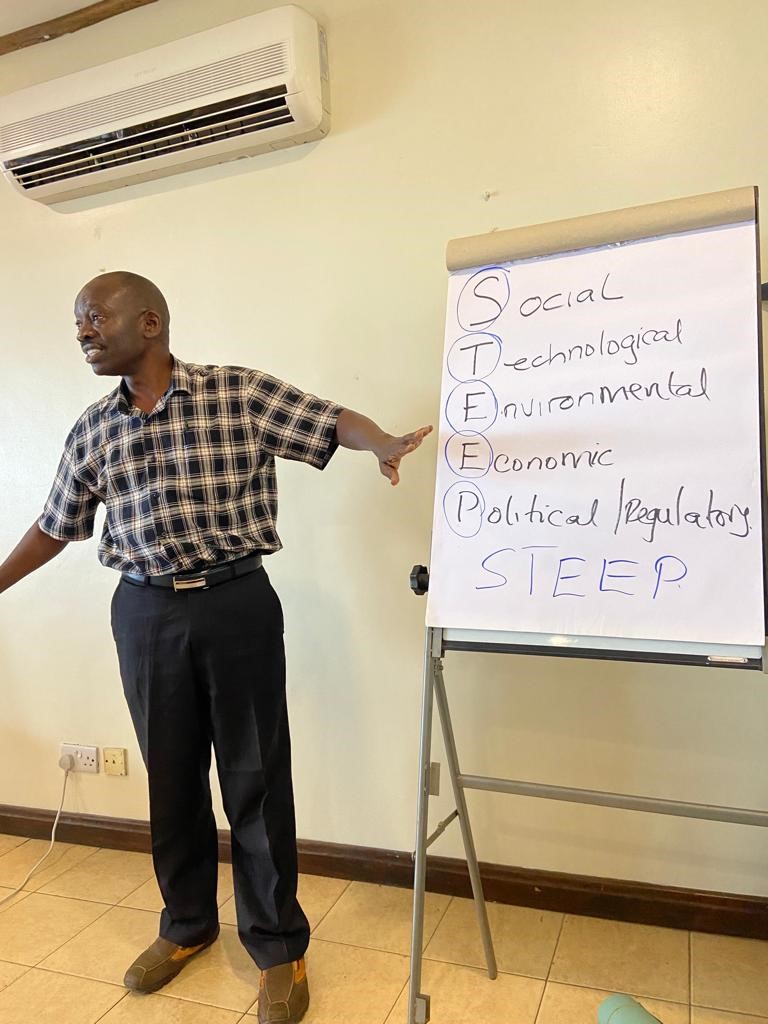
Figure 2: Professor Byaruhanga introducing STEEP to the stakeholders.
The facilitators went through the various APP stages and gathered feedback from the stakeholders on charts posted across the room. Figure 3 shows the rules of engagement that the stakeholders agreed on. It was expected that stakeholders would be tired and less engaged towards the end, but surprisingly, they remained active and not clock-watching. The stakeholders gave glowing reviews of the APP method and hailed the workshop as different and engaging. A stakeholder remarked, “This workshop is unlike any other I have attended, it is well structured and it was very easy to follow proceedings and everyone had a chance to speak”. They also expressed their hope that the issues and information generated from the workshop be taken forward to benefit their catchment. They wanted to be part of the solution. Figure 4 shows all stakeholders who attended the workshops assembled on the deck of venue with Lake Victoria in the background.
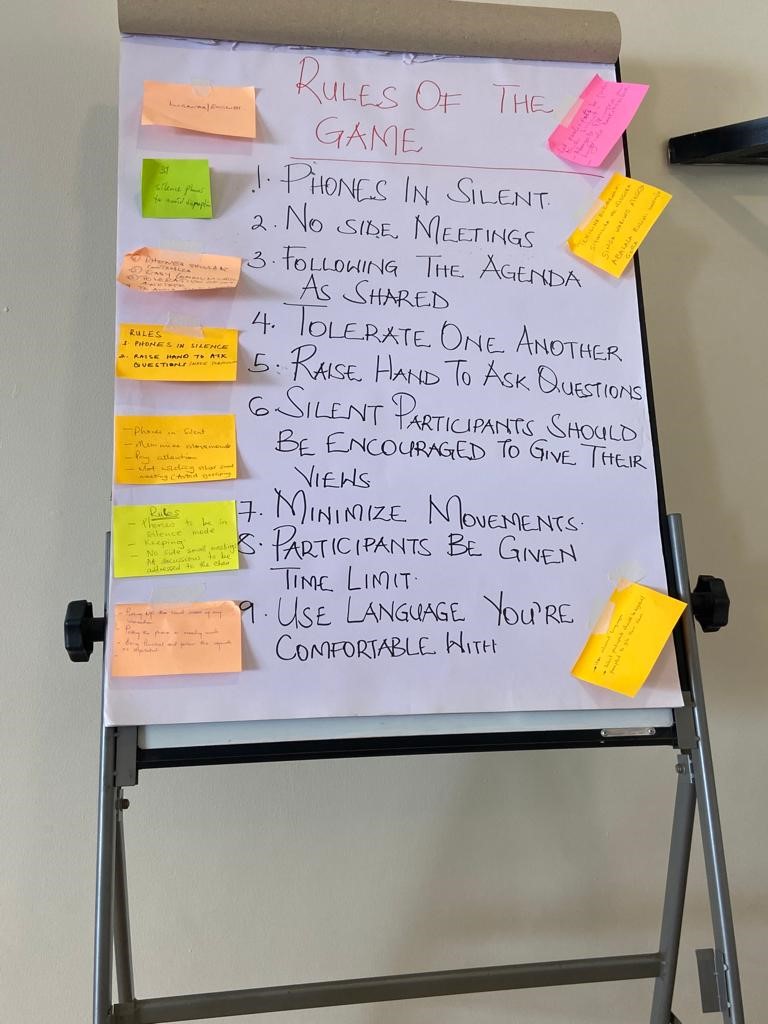
Figure 3: Rules of engagement as agreed on by the stakeholders.
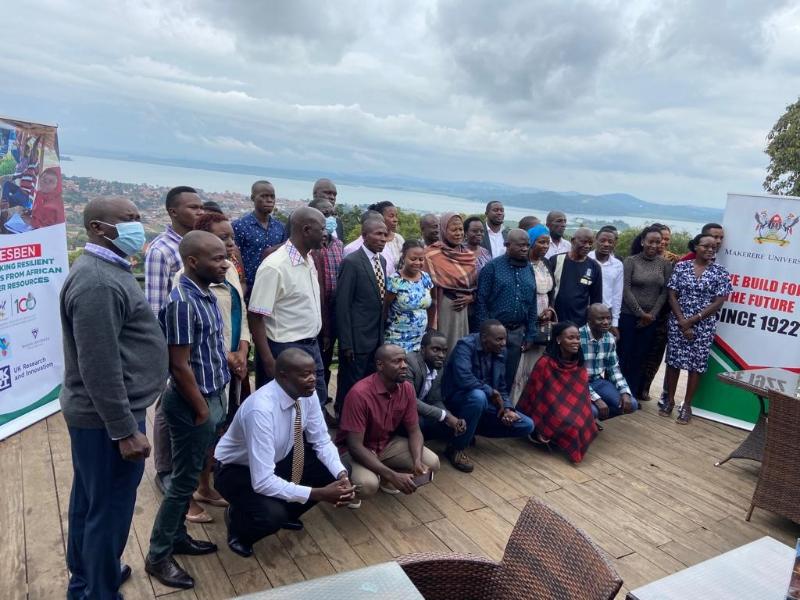
Figure 4: The stakeholders that attended the workshop.
Last Modified: Tue, 29 Nov 2022 11:53:10 SAST
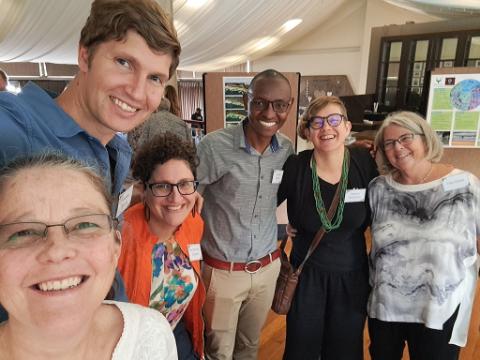
From left to right: Margaret Wolff, Dr Matthew Weaver, Dr Ana Porroche-Escudero, Timotheo Ndimbo, Dr Rebecka Henriksson, and Prof Tally Palmer at GRIN 2022
Six members of the ARUA Water CoE presented at the Garden Route Interface and Networking (GRIN) meeting held in Sedgefield from 11th to 13th October 2022. This networking meeting is held annually and provides a forum for researchers and practitioners interested in understanding and managing (navigating) social-ecological systems and their complex interactions and feedbacks. The Adaptive Systemic Approach framing the UKRI-funded Unlocking resilient benefits from African water resources (RESBEN) project, was given its own session on Day 2 of the meeting.
On Day 1 of the meeting, Timotheo Ndimbo, a research assistant from the University of Dar es Salaam, Tanzania, presented his work on the Great Ruaha Catchment Water Committee in the Great Ruaha River Catchment. This Water Committee is a River Basin Organisation which is recognised as a space to enable participatory governance in water resources management. His work uses Gaventa’s Power Cube Framework and Arnstein Ladder of Participation to analyse aspects of stakeholders’ power and participation in the Water Committee decision making processes. His analysis suggests there are challenges to achieve full participation in the Committee and his work continues to explore options for strengthening stakeholder engagement.
In the ASA-RESBEN Session, Professor Tally Palmer presented an overview of how the Adaptive Systemic Approach emerged from more than a decade of collaborative research. She introduced the audience to the three overarching theories of complex social-ecology systems (CSES), transdisciplinarity and transformative social learning, showed how the project is implemented in seven African Countries, and connected the overview to the subsequent presentation.
Margaret Wolff presented a sliver of the Adaptive Planning Process workshop which forms an integral part of the Adaptive Systemic Approach. She emphasised the role of facilitation in the workshops and the key lesson of the importance of the use of home language to enable all participants in the workshop to participant more easily.
Dr Matthew Weaver unpacked the use of the Value Creation Framework by the RESBEN project to illustrate the value for participants as they engaged in the social learning spaces in the project. The creation of different types of value (for example immediate, potential, applied, realised, transformative and strategic ) for participants impacts their ability to make the difference they care to make through their work. In addition, value is evidence of current and future impact related to their engagements, working lives and the information they share with colleagues and stakeholders. This value is often overlooked by traditional ‘tick box’ monitoring and evaluation techniques.
Dr Rebecka Henriksson discussed the significance of integration between disciplines (e.g. natural science and social science), methods and data sources, and between academic and non-academic knowledge, across the project and in particular stressed the importance within a CSES and sustainability science framing. To this end, Dr Henriksson and colleagues have developed a tool to assist researchers and students to consider how they might be able to enhance the SES integration and transdisciplinarity in research and project design.
Finally in the session Dr Ana Porroche-Escudero challenged the meeting to think about the continuing ‘divide’ between funding and research in the Global North and Global South. She spoke about the past, existing and continuing institutional structural inequalities that persist in an African context and between Africa and the Global North. She argued that if research led by southern research institutions is to remain an investment priority from the global north, there is a need to (a) recognise the asymmetrical North/South funding dynamics guiding research and funding and, (b) develop enabling support mechanisms to overcome and/or mitigate the real impact of compounding structural inequalities.
Last Modified: Tue, 08 Nov 2022 09:59:22 SAST
News article on the recent Adaptive Planning Process workshop
Last Modified: Thu, 18 Aug 2022 09:23:46 SAST
By Rebecca Powell, ARUA Water CoE Postdoctoral Research Fellow
18 February, 2022
The Senegal Country Partner or ‘Node’ of the ARUA-UKRI Research Excellence Grant conducted an Adaptive Planning Process (APP) workshop from 30 November – 1 December, 2021 at Dior Hotel in Saint-Louis, Senegal. This was a two-day workshop with researchers from the University of Cheikh Anta Diop in Dakar and key stakeholders who are intimately interested and involved in water and ecosystem management issues in the Lake Guiers area of the Senegal River Basin. The aim of the workshop was to facilitate a shared space in which the stakeholders and researchers could share concerns and knowledge of the issues in Lake Guiers, and collectively agree on a vision towards improved water and ecosystem management.
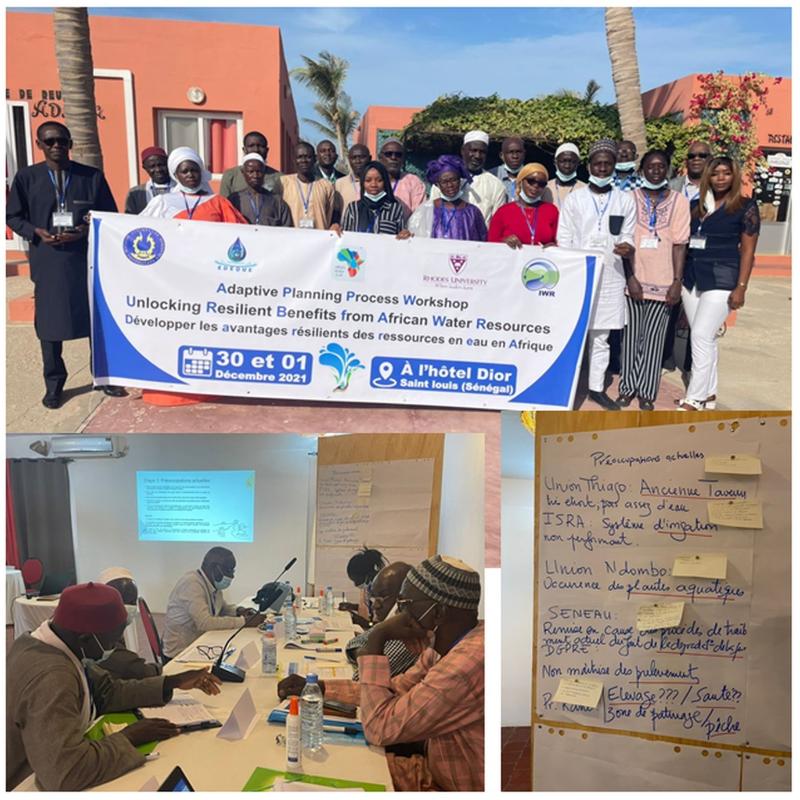
Figure: Workshop participants including the Senegal Node facilitation team from the University of Cheikh Anta Diop and key stakeholders of the Lake Guiers.
The workshop was facilitated by members of the Senegal research team including the two project leaders, Prof Serigne Faye and Prof Alioune Kane with pre-workshop advisory and training support from the ARUA Water CoE Team, namely Dr Matthew Weaver, Dr Notiswa Libala and Dr Rebecca Powell. The group of more than 20 workshop participants (see Figure) had divergent roles and interests in the Lake Guiers and included private and government water and agriculture management agencies, agro-industry, water users and researchers.
The APP is a component of Strategic Adaptive Management (SAM) and is a step-by-step facilitated process of engagement of interested and affected parties around a particular environmental management issue – in this case a water management issue. The goal is to develop a set of objectives or an ‘action plan’ towards effectively addressing the issue with time and to adapt the vision and objectives through ongoing reflection and learning.
The agreed vision by the group during the Senegal APP workshop was:
"A better knowledge and efficient and participatory management of the Guiers basin for water security by 2035 ". This vision was underpinned by five common values which included: Commitment, Equity, Solidarity, Consideration and Courage. The group then agreed on a set of objectives that would action towards achieving this vision with time with a focus on:
The success of the workshop was enabled by the ability of the facilitators to create a space where participants could openly express, either verbally or in writing, concerns and opinions related to management issues in Lake Guiers. This was important as each stakeholder group or individual present at the workshop had different experiences related to access to water and governance, and personal background in relation to water issues in the Guiers Basin. Women in particular can be marginalized in decision making and were therefore particularly encouraged to voice their concerns and knowledge. Going forward, the Senegal and ARUA Water CoE Teams will host a follow-up stakeholder workshop in 2022 with particular focus on how APP and SAM are linked and how the principles of SAM can be taken up and applied in the Lake Guiers key actors.
Last Modified: Mon, 28 Feb 2022 15:57:10 SAST
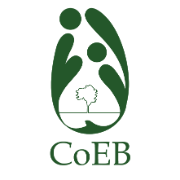
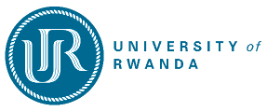
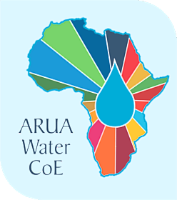
By Venant Nzibaza, Research Assistant for RESBEN in Social Science
University of Rwanda, Centre of Excellence in Biodiversity and Natural Resource Management (CoEB)
The World Wetlands Day is celebrated every year on 2 February. Its aim is to raise the global awareness about the vital role of wetlands for people and the planet. This day also marks the date of the adoption of the Convention on Wetlands signed on 2 February 1971 in Ramsar city, Iran. In this regard, the Center of Excellence in Biodiversity and Natural Resource Management (CoEB), based in the College of Science and Technology, University of Rwanda hosted a webinar to discuss the current status of wetlands conservation in Rwanda, and to explore the challenges and opportunities.
The webinar was organized on 2 February 2022, where six speakers from three institutions participated. These were Mr. Alphonse Nzarora (Research Assistant for the UKRI-funded ARUA Water CoE project titled ‘Unlocking Resilient Benefits form African Water Resources’[RESBEN]https://www.ru.ac.za/iwr/aruacoe/ and Assistant Lecturer at the University of Rwanda), Professor Elias Bizuru (Research Associate of the CoEB and lecturer at the University of Rwanda),Mr. Jean Ferus Niyomwungeri (Community Conservation Programme Manager at Rwanda Wildlife Conservation Association), Dr. Deo Ruhagazi (Senior Programme Manager and Veterinarian at Rwanda Wildlife Conservation Association), Mrs Christelle Suavis Iradukunda (Bugesera Landscape Manager at Albertine Rift Conservation Society, ARCOS) and Mrs Brigitte Kanyamugenge (Head of Community Development Programme at ARCOS). The webinar was attended by 104 participants and took place on google meet. Participants came from different disciplines across the planet. The recording of the webinar can be found here.
Alphonse Nzarora in his presentation stressed the importance of using biological indicators in water quality monitoring. He specified that one of the benefits of the use of bioindicators is their ability to indicate some of the indirect effects of pollutants that cannot be indicated by physical and chemical measurements. He also added that biological assessment of water quality is comparatively cost-efficient and requires basic equipment compared to the use of physicochemical properties. He concluded that biological indicators could be an answer where financial limitations are an issue for monitoring water quality.
Elias Bizuru presented about the sustainable use of wetlands in Rwanda. He highlighted different ecosystem services provided by wetlands and mentioned some of the opportunities and challenges faced by wetland conservation in Rwanda. The opportunities include the availability of water for irrigation and the rich biodiversity while challenges include invasive species and pollution from inorganic pollutants from agriculture.
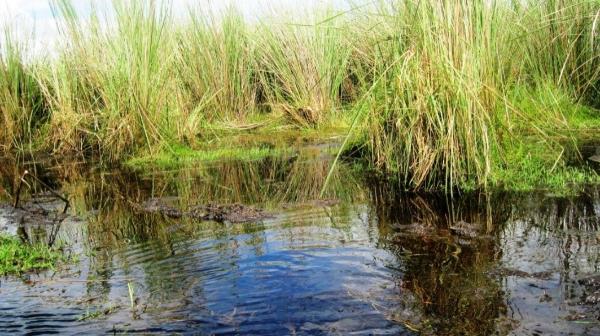
Example of a restored wetland in Rwanda (Rugezi wetland), the only Ramsar wetland in Rwanda that has been restored in 2004. Photo by Prof. Elias Bizuru.
Christelle Iradukunda and Mr. Brigitte Kanyamugenge presented about the efforts made by ARCOS to restore the Amasangano wetland located in the Eastern Province of Rwanda. The Amasangano wetland is located at the confluence between Akanyaru and Nyabarongo Rivers. This wetland was recently impacted by unsustainable agriculture, invasive species, unsustainable fishing and quarries for clay extraction. Additional challenges in the area include droughts and floods while opportunities include tourism activities.
Jean Ferus Niyomwungeri and Mr. Deo Ruhagazi shared a pre-recorded video about the work of RWCA to protect wetlands that are home to endangered grey crowned cranes. According to the video shared during the webinar, RWCA has restored Umusambi village, a privately owned touristic wetland located at Kabuga, in Kigali city. The restored wetland is now home to cranes. Further, the video revealed an almost doubling in the number of cranes in Rwanda from 487 in 2017 to 997 in 2021.
In the open discussion, Dr. Deo Ruhagazi mentioned that wetlands in Rwanda are divided into three classes. He said that some wetlands are fully protected, others are conditionally used while others are unconditionally used. Fully protected wetlands are only for conservation and no activity should take place there except conservation activity. Wetlands which are used conditionally can be used for limited activities such as organic agriculture while wetlands which are used unconditionally can be used for any activity according to preferences of the owner.
Conclusion
This webinar was an opportunity to share experience among different researchers working in different organizations and those who have a stake in wetland conservation. All discussions were intended to guide future research and restoration activities. The webinar stressed the importance of checking the class of the wetland, whether it is to be used conditionally or unconditionally or if it is fully protected before any intervention. The other recommendation is to look back at the wetland’s history and check the original status of the wetland. This information will then guide restoration activities especially when choosing which plants need to be planted in a given wetland. The other importance of this information is to be able to set realistic targets when planning restoration interventions.
Last Modified: Fri, 18 Feb 2022 09:56:41 SAST
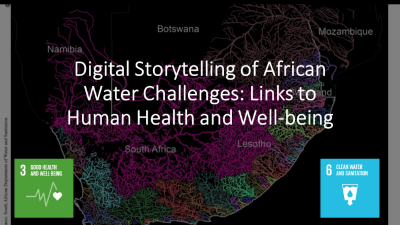
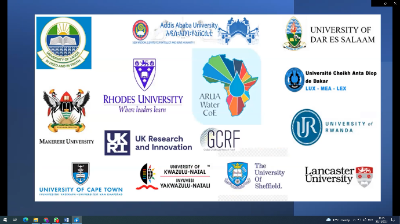
The ARUA Water CoE hosted a workshop at the third ARUA Biennial conference, a virtual event held on the 19th of November 2021. The theme was ‘Digital Storytelling of African Water Challenges’ linked to human health and well-being and the Sustainable Development Goals (SDGs). Digital Storytelling (DST) is an approach to the ancient art of storytelling that uses modern technologies to create short stories comprising different elements of multimedia – photo, video, and audio. DST has multiple uses within the research environment, such as collecting stories, data, monitoring and evaluation, reflection and learning.
The goal of the CoE workshop was to showcase how digital storytelling can enhance science communication with civil society in relation to the work Early Career Researchers (ECRs) of the Water CoE are conducting under the ARUA-UKRI Grants. See below a snapshot of the workshop programme:
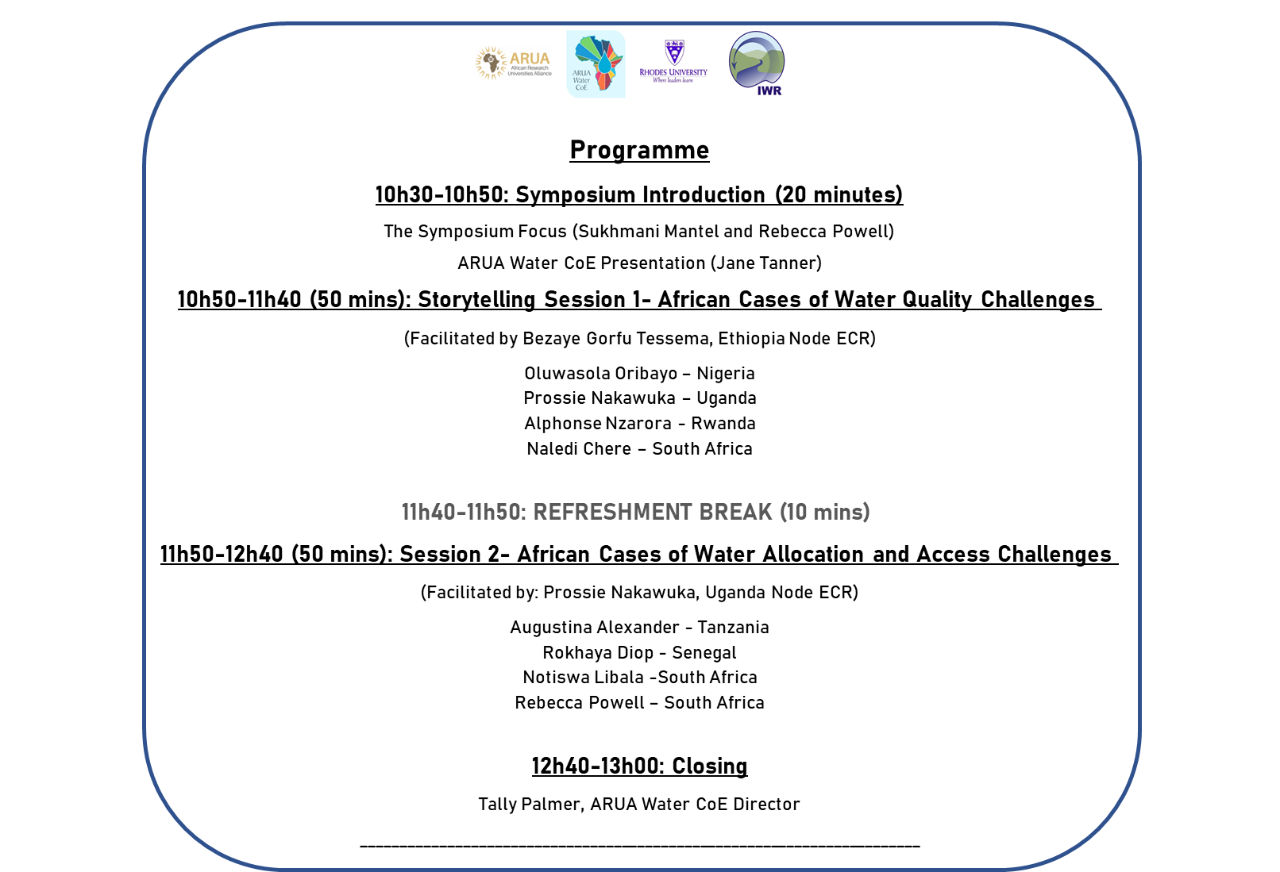
The workshop was attended by 34 people including representatives from our Water CoE African Nodes and other international guests (see Figure xx below). The main successes and outcomes of the workshop included:
In conclusion, the Water CoE workshop generated excitement and presented an opportunity for our partners to further explore the use of the tool in their water related work.
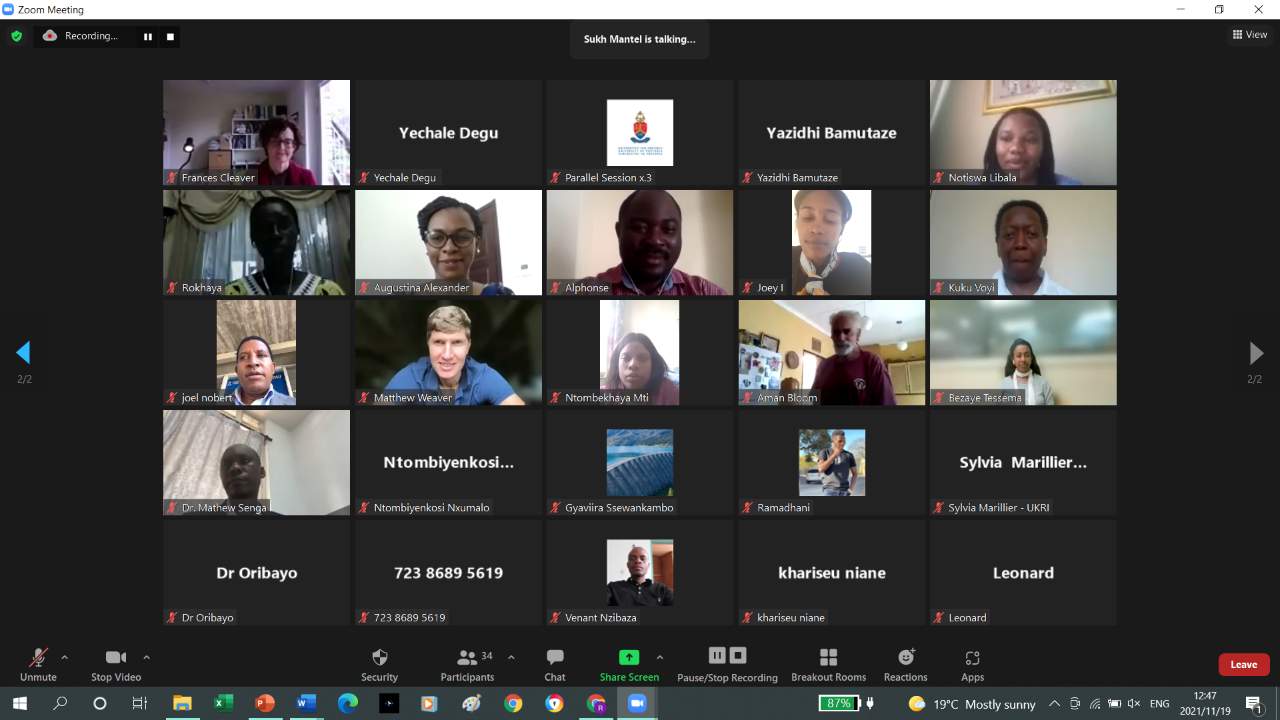
Figure : A screenshot of some of the 34 participants who attending the ARUA Water CoE Workshop at the Biennial Conference on 19th November, 2021.
Last Modified: Fri, 03 Dec 2021 11:06:31 SAST

The African Research Universities Alliance (ARUA) Water Centre of Excellence (CoE) in the Institute for Water Research (IWR), Rhodes University is very excited to announce the arrival of Dr Bezaye Gorfu Tessema. Bezaye has been awarded the Carnegie Early Career Research Fellowship through the African Research Universities Alliance (ARUA) for one year beginning October 2021. She is being hosted by the ARUA Water CoE under the supervision of the Water CoE Director, Professor Tally Palmer and the Water CoE Co-director, Dr Jane Tanner.
During her time in the Institute, Bezaye will work on water related research and capacity development initiatives under the Water CoE ARUA-UKRI Research Excellence and Capability Grants. She will also be working with other researchers in the IWR on carbon sequestration related research in natural versus degraded lands in the Eastern Cape of South Africa. Bezaye will function as an integral member of research teams, delivering presentations and participating in technical workshops with fellow researchers and other stakeholders. She will also assist in creating and bolstering partnerships between the ARUA Water CoE and African and European research and innovation units. Her works will therefore contribute significantly to the intellectual vitality of the IWR and Water CoE.
Bezaye, is an Early Career Environmentalist by profession and has been conducting research on Sustainable Land Management and Terrestrial Carbon Sequestration. Bezaye has been working on water pollution and its impact on ecosystem and human health at the Ethiopian Institute of Agricultural Research, University of New England and Water and Land Resource Centre of Addis Ababa Universities, respectively. She earned her PhD in Terrestrial carbon from the University of New England, Australia, MSc in Environmental Sciences and BSc in Plant Science from Addis Ababa and Haramaya Universities Ethiopia, respectively.
Bezaye has always been keen and passionate about contributing to the research and development efforts for viable social impact of the research she does towards food and water secure communities, sustainable development, climate change adaptation and mitigation. She believes this can be promoted through networking, partnerships, innovation, and active participation of stakeholders including institutions and communities at large. She is currently interested and heading toward more inclusive, transdisciplinary, adaptive and systems thinking research approaches to better use and manage resources and achieve SDGs, and hopes to work more on these themes during her time with the Water CoE.
Contact details:
Cell Phone: +27787712918
WhatsApp: +251911184494
E-mails: B.Tessema@ru.ac.za / bezaye.g@wlrc-eth.org / ransomgog@yahoo.com
Social Media network: Bezaye Tessema | LinkedIn; Bezaye G. Tessema (researchgate.net)
Tally Palmer, from Rhodes University, Institute for Water Research (IWR) and the Director of the ARUA Water Centre of Excellence (CoE), was involved as a contributor in an event that shared emerging lessons on themes of resilience, water security and multinational interdisciplinary research partnerships in the context of UK and EU funding programmes on 6th July. The event was organized by Dr Adrian Healy, a Future Leaders Fellow at Cardiff University. The event included presentations from existing projects in order to learn from previous programmes promoting resilience under UK funding. With a focus on practical examples of AU-EU-UK collaborations the event shared knowledge of past activities, future potentials and the opportunities emerging from national and European Union funding programmes. The event raised awareness and built prospective research communities.
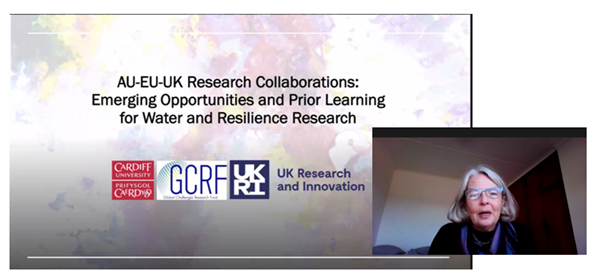
Prof. Tally Palmer, Director of the ARUA Water CoE presenting during the event.
The programme included presentations from representatives of European Commission and Welsh Government and on-going collaborations under Horizon 2020. Fadila Boughanemi (European Commission) introduced the Horizon Europe programme and highlighted the opportunities for cooperation with partners in Africa. Calum White (Welsh Government) introduced the new International Learning Exchange (ILE) that has been launched by Welsh Government. Amongst other things this can support the development of new collaborations through staff mobility (including the development of projects with international partners and strategic partnerships).
Mark Pelling (Kings College London), Tally Palmer (Rhodes University) and Esther Diez Cebollero (Water JPI) provided insights based on their own experience. Tally Palmer highlighted how research funding tends to be relatively short-term (3 years or less) and asked whether a different approach is needed to help develop sustainable impacts. Building relationships and working collaboratively takes time. Mark Pelling outlined some key principles for collaborative working that have emerged from the experience of Global Challenges Research Fund (GCRF) funded projects in the construction of co-production and interdisciplinarity, namely: communication, sharing values and language; being problem-focused and focus-led (helps to organise multiple view points and to avoid assumptions about role/contribution); be flexible and be prepared to fail and learn (and know when to change direction) – how do we build monitoring and evaluation systems so that we know when to change direction and perhaps partner in ways that are not destructive; ownership of incentives and framing of incentives (recognise value of publications as an incentive don’t dismiss them); relationships take time, understanding and empathy (and we must think differently about remote working).
Mark and Tally both also highlighted the moral and ethical elements to sustaining partnerships and relationships, as the GCRF cuts have brought to the fore. We should also not overlook the significance of transdisciplinarity (respecting different knowledges) – the opportunity to engage in participatory actions involving a range of actors (boundary spanning). Who has the skillset to connect and combine the networks of knowledge that are needed to shift problems? A common theme was the importance of spending time to build shared expectations of the roles everyone has, to ensure equity and to lay the foundations for open and transparent working practices (including open (and devolved) budgets). A valuable approach is to not assume that English will be the default language (with translation to English).
Looking to the future, there is likely to be a push for a global shift towards adaptation approaches in response to climate change. Speakers noted their expectation that this will promote research agendas (and funding) and include connections to social and economic justice.
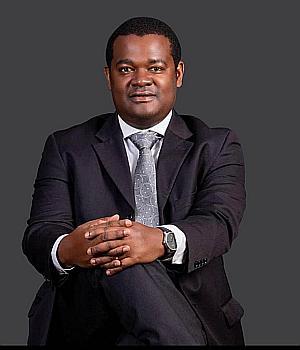
Water CoE Node Leader: Makerere University
African Research Universities Alliance (ARUA) Water Centre of Excellence
We are deeply saddened by the passing of Prof Noble Ephraim Banadda, who lead the ARUA Water CoE partner University based at Makerere University.
We first met Professor Noble Banadda and End. Dr. Isa Kabenge, in Stellenbosch, South Africa. I well remember their animated contributions. At one of the evening functions the four of us were talking, and Professor Ernest Aryeetey, ARUA Secretary General, shared with us his dreams of a set of UK funded grants, the first, available to all ARUA Centres of Excellence, and a second, larger grant to be competitively awarded. I remember thinking “we will go for those”.
How could we have guessed that we would win the grants, and then, the vibrant person we had met and worked with would tragically pass away in the ravages of the Covid-19 pandemic.
We have wept and remembered, and we have watched, listened to, and read others’ remembering. The person who emerged from these memories was instantly recognizable. Noble: the extraordinary man with a huge personality – and great heart. All the tributes to Noble have first and foremost celebrated and honoured the person – his generosity, humour, kindness, passionate enthusiasm and warm engagement with those he encountered. Then came all the acknowledgements of a fine, exceptional academic. As with everyone else, the researchers and students in the ARUA Water CoE experienced both those aspects.
Noble was a strong influence at the Water CoE launch and inaugural workshop in 2018, where we all agreed on the principles of collaboration, and the academic orientation, the CoE would adopt. He was an active contributor as we co-developed the many stages that led to the award of both the UKRI grants, and will be a posthumous co-author on the paper on the Adaptive systemic Approach we have developed.
Noble: we join your family, friends, colleagues and wide international network in remembering you with sorrow and honour, and we send our deep condolences to all who have loved you.
Eng. Dr. Isa Kabenge will take on the leadership of the Makerere University ARUA Water CoE Node. It is hardly possible to remember Noble without Isa – always the two – talking, laughing, offering insightful comment. Isa, we know you are mourning and we offer you all the support we can. Together we will do justice to Noble’s legacy.
Professor Tally Palmer, Dr Jane Tanner, and all of the ARUA Water CoE
7th July 2021
See the Noble Banadda farewell document.
Research at a Distance: Changing Approaches and Equitable Partnerships workshop was hosted by Dr Adrian Healy, UKRI Future Leader Fellow, Cardiff University on 12 April 2021. The workshop was 2 hours and 30 min long and comprised a formal working group with a number of experts such as academics, NGOs and research practitioners from different countries who are part of the collaborating partners of Cardiff University UK. Members of the Water CoE including Prof Ezechiel Longe, Ms Sandra Mutesi, Ms Rokhaya Diop, Prof Zerihun Woldu, Dr James Akanmu, Dr Sukhmani Mantel and Dr Bukho Gusha were among more than 30 people who attended this workshop.
Last Modified: Thu, 29 Apr 2021 10:25:46 SAST
Introduction
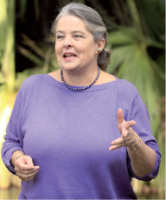
Professor Tally Palmer, from Rhodes University, Institute for Water Research (IWR) led a webinar on ‘An adaptive, systemic approach to community-led engaged research’. The webinar was chaired by, Professor Cyril Nhlanhla Mbatha, from Rhodes Institute for Social and Economic Research (ISER). The presentation by Prof. Palmer was followed by a brief presentation by Dr. Nontuthuzelo Gola from the South African National Biodiversity Institute (SANBI) on her work on water security in the uMngeni River catchment in South Africa.
Prof. Palmer is the Director of the IWR and the African Research University Alliance (ARUA) Water Centre of Excellence (CoE) hosted by IWR at Rhodes University. Prof. Palmer is a seminal leader in the field of engaged transdisciplinary research and complexity- systems based approaches to integrated water resource management (IWRM).
Dr. Gola works for the South African National Biodiversity Institute (SANBI) and is currently the Ecological Infrastructure Coordinator for the Greater uMngeni Catchment under the ‘Ecological Infrastructure for Water Security’ Project at SANBI. She holds a PhD in Water Resource Science from Rhodes University.
The Webinar
Prof. Palmer led the webinar by introducing the key principles of the ASA concept and how these can be applied to solving water and land related problems in South Africa and across the African continent. The ASA steps summarized by Prof. Palmer during the webinar include:
1. Bounding the project system by bringing together all key stakeholders with their unique knowledge to understand the water / land related issue at hand.
2. An adaptive planning process with key stakeholders to consider the many factors that contribute to and interact to shape the particular water / land issue and develop a plan for addressing the issue.
3. Undertaking research and stakeholder engagement to apply the plan (from 2. above) and attempt to develop participatory governance for addressing the water / land issue.
4. Apply a participatory monitoring, evaluation, reflection and learning process related to the above steps to document lessons learnt and adjust the project plans and objectives from the lessons learnt.
Prof. Palmer indicated that the ARUA Water CoE is applying the ASA in a project called, ‘Unlocking resilient benefits from African water resources (RESBEN)’. This project brings together partners from six universities across Africa and three universities in South Africa to collaborate on research that addresses SDG6: Sustainable water and sanitation for all. One of the key issues that the RESBEN project will focus on is water resources governance and how this strongly influences how we address water and land related issues in Africa. In particular, the focus is on governance that centers around inclusive and participatory decision-making including as many key stakeholders as possible. The project is also founded on a transdisciplinary approach to understanding and managing water issues that are complex and require knowledge inputs from multiple knowledge bases and disciplines.
Dr. Gola added to the presentation by indicating how the ASA is being applied to water management related issues in the uMngeni River Catchment in South Africa. Dr. Gola indicated the importance of participatory planning processes and stakeholder engagement for addressing the existing water issues in the uMngeni.
Final remark
The webinar was well received by local senior academics and postgraduate students who gained insight into the importance of the adaptive systemic approach for participatory and engaged research that has a real impact on how we manage land and water resource issues in South Africa.
Last Modified: Mon, 29 Mar 2021 11:24:58 SAST
Story highlights
Makerere University has committed to continue the momentum on the international project “Unlocking Resilient Benefits from African Water Resources” (known as RESBEN). The project involves six nodes in Ethiopia, Uganda, Rwanda, Senegal, Tanzania, Nigeria, South Africa as well as UK partners. It is funded by UKRI through the ARUA Water Centre of Excellence at Rhodes University, South Africa. The super goal of this project is to produce knowledge that shift water development practice towards greater equity and sustainability.
After a lot of background work dealing with administrative hoops presented by international grants, COVID challenges and cross-country logistics, Uganda convened the first RESBEN country meeting on Feb 5, 2021.
Uganda brought together 17 stakeholders from a mix of backgrounds from formal water institutions including the Ministry of Water and Environment and the National Water and Sewerage Corporation, Kampala Capital City Authority as well as top academics from the Universities of Makerere, Rhodes (South Africa, SA), Sheffield and Lancaster (UK).
Prof. Noble Banadda, node lead for Uganda and OR Tambo Research Chair and Chair of the Department of Agricultural and BioSystems Engineering at Makerere University, opened the session and welcomed participants. After participants’ short introduction, Professor Tally Palmer, Principal Investigator of RESBEN, gave a project overview and explained the Adaptive Systemic Approach that underpins RESBEN. This approach considers the close interconnection of complex social and ecological systems. In attending to complexity, Prof Palmer stressed the importance of linking social sciences with natural sciences as well as the equal representation of diverse stakeholders at the discussion table.
The opening was followed by Prof Banadda’s presentation of the background to project in Uganda. In particular, he explained the Ugandan node will look to understand the sources, pathways and impact of pollution in urban water and will compare findings with other urban water research nodes in Lagos (Nigeria) and Cape Town (SA)
MA students recruited as research assistants will play an important role in shedding light on the backbone of pathways of water pollution. Sandra Mutesi and Christine Namuddu gave two sterling presentations about preliminary thoughts on their research directions. Ms Mutesi, who will complete a MA in natural sciences, is considering looking at pollutants in Nakivubo water drainage channel and fish at Ggaba landing site and into Lake Victoria, including pollutants in fish and water. From the social sciences angle, Ms Christine Namuddu plans to examine the relationship between the local people and the water governance institutions and identifying potential indicators of change.
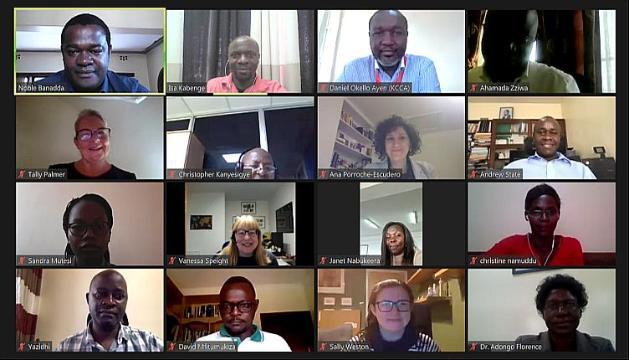
After the presentation, Prof Banadda opened the floor to questions. Dr Florence Adongo from the Ministry of Water expressed her interest in being involved in the project and facilitating data for the MA students to conduct their literature review. Similarly, Chris Kanyesigye from NWSC reported that they have done two phases of Lake Victoria Environmental Management Project (LVEMP) research into this area and is happy to share findings to inform the literature review and methodology.
Other participants including Prof Vanessa Speight, Dr Sally Weston (Sheffield) and Dr Ana Porroche-Escudero (Lancaster Environment Centre) agreed that the research projects look exciting and proposed ways to facilitate methodological and contextual dialogue between the two students so their work complement and strength each other.
The Ugandan node is in the process of revisiting its approach to engaging a wide range of stakeholders including local residents, civil society, non-governmental organisations and private business and
Although the agenda was busy and the meeting was well attended, the chair managed to create an engaging and dynamic atmosphere and kept the meeting running to time!
Last Modified: Thu, 18 Feb 2021 10:52:41 SAST
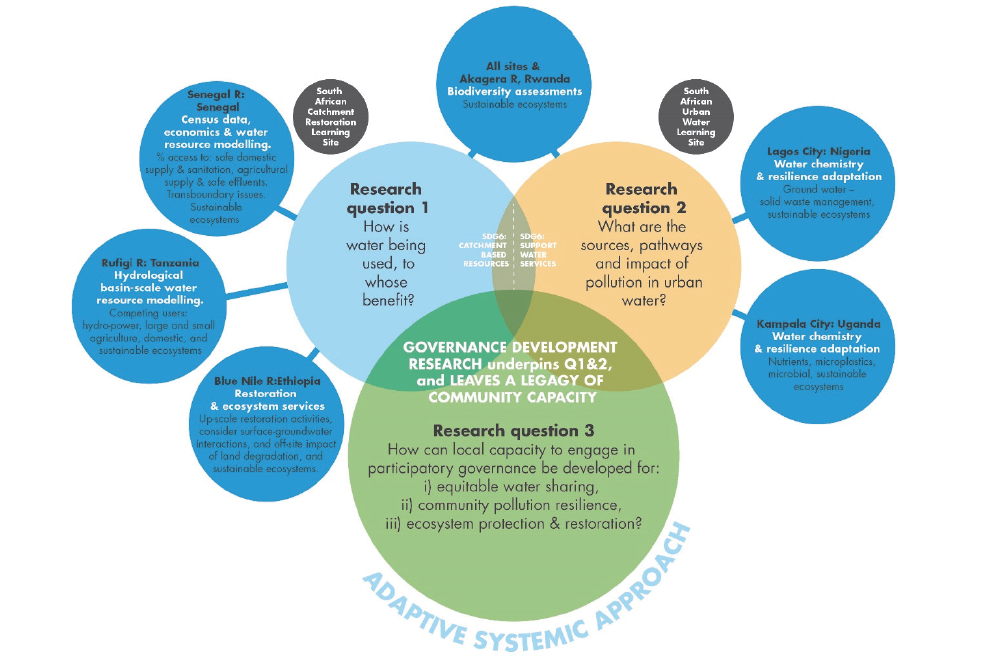


United Kingdom Research and Innovation (UKRI) announced the outcomes of its African Research Universities Alliance (ARUA) partnership research programme to tackle global challenges such as disease, poverty, climate change, fragile states and food insecurity. This research programme is a key part of UKRI’s three-year partnership with ARUA, developed through the Global Challenges Research Fund (GCRF), to strengthen pan Africa-UK collaborations across all disciplines, mobilise excellence and build robust research ecosystems across Africa.
UKRI works in partnership with universities, research organisations, businesses, charities and governments to create the best possible environment for research and innovation to flourish. ARUA is a network of universities from different countries and different historical backgrounds, but with a shared vision. It aims to enhance research and graduate training in member universities through several channels, including the setting up of Centres of Excellence to be hosted by member universities. The ARUA-UKRI research programme has two strands: Capacity Building to support the 13 ARUA Centres of Excellence, and Research Excellence to support four multidisciplinary and multinational projects addressing the UN’s SDGs; the latter is the one that has been just announced.
The Institute for Water Research at Rhodes University is one of the four cross-cutting Excellence award winners. Professor Carolyn Palmer is leading the project titled “Unlocking resilient benefits from African water resources” (more information at https://www.ru.ac.za/iwr/aruacoe/). The awards for the Centres of Excellence will enable the awarded Centres of Excellence to develop into expert hubs where leading researchers, alongside a new generation of researchers, collaborate and undertake world-class research across priority themes including energy, water conservation, urbanisation and food security. The four joint research excellence projects will help forge new relationships and synergies between the ARUA Centres of Excellence and UK-based GCRF researchers. They together will build on existing activities to develop new proposals and projects aligned to the Sustainable Development Goals (SDGs). Both aspects of the research programme will help strengthen and expand Africa’s crucial research base (see https://www.ru.ac.za/iwr/aruacoe/about/ for more details).
Rhodes University’s Director for Institute for Water Research, Professor Carolyn Palmer said the Institute was thrilled to be part of the international research consortium. “Water is fundamental to thriving human life and society, and people are inextricably part of the natural environment. But with growing demands on water across Africa, and increasing constraints on supply, there is an urgent need for new research, methodologies and practices to meet the SDGs and realise the Africa Water Vision 2025” she said.
The research will see a collaboration that will bring together researchers from South Africa, Ethiopia, Rwanda, Senegal, Tanzania, Uganda, Nigeria and the UK, to form an African water research cohort, addressing water-related SDGs, with community engagement to catalyse change. Previously, the Water CoE was also successfully awarded an UKRI GCRF Capacity Building Grant entitled Water for African SDGs, which commenced in August 2019 with the aim to establish and develop the ARUA Water CoE as an effective, high-performance, hub and network of 8 African Universities’ researchers and post-graduate students. The CoE will use research to catalyse change towards social and ecological justice and sustainability, paying attention to African community water and sanitation needs.
UKRI’s International Champion, Professor Andrew Thompson said: “To sustainably address global challenges, we need a genuine global response and that means forging stronger partnerships that are fair, equitable and fully reciprocal between researchers in the northern and southern hemispheres. This exciting research programme with ARUA is supporting research that transcends national boundaries and will produce different ways of thinking about challenges and different solutions to tackling them.”
ARUA Secretary-General, Professor Ernest Aryeetey said: “I would love to see a world where discussions about global health are influenced by work done in Africa, where discussions about climate change are influenced by African researchers and where African governments and the international academic community listen to African researchers. ARUA’s partnership with UKRI is an important stepping stone to realising this vision.”
Last Modified: Tue, 03 Nov 2020 15:17:47 SAST
A 3-day training course titled Addressing Complex Water and Land Problems: Applying the Adaptive Systemic Approach, was held in Addis Ababa, Ethiopia in February 2020. The course was hosted by the University of Addis Ababa, Land and Water Resources Centre (WLRC-AAU), and presented and facilitated by the CoE Director Professor Tally Palmer. Dr Gete Zeleke (Director WLRC- AAU) and Professor Zerihun Woldu (Water CoE Co-Director) opened the course and welcomed participants from all nine nodes, and four UK participants, funded by the UK N8 Universities. Each node sent a senior or mid-career researcher, an early career researcher and a post-graduate student. The course focussed on applying the novel Systemic Adaptive Approach (details of which are found in the handbooks in online resources) which forms the foundation of the research carried out under the GCRF Excellence Grant.
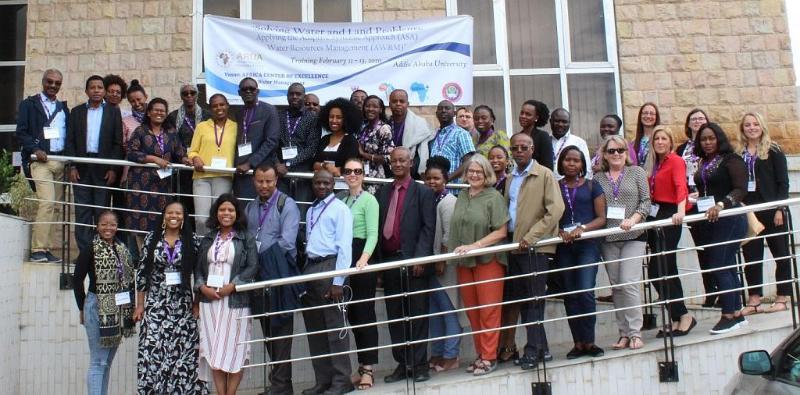
Participants at the ARUA Water CoE foundation course, funded by UKRI:GCRF Capability Grant: Addressing Complex Water and Land Problems: Applying the Adaptive Systemic Approach. The course was hosted by the University of Addis Ababa, Land and Water Resources Centre and presented and facilitated by ARUA Water CoE Director, Professor Tally Palmer.
On Day 2 of the course participants practiced running the Adaptive Planning Process Step of the Adaptive Systemic Approach. The goal was to develop a Strategic Plan for the Water CoE 2020-2024. As part of the Adaptive Planning Process, participants developed a set of common values. These were used as the basis for reviewing the Principles of Ethical Practice first drafted at the launch workshop. Jo Rose from the University of York then facilitated a session on developing an Ethical Code of Practice. The emerging Water CoE Ethical Code of Practice will be reviewed annually. The Safeguarding training planned for later in 2020 will contribute to the first review.
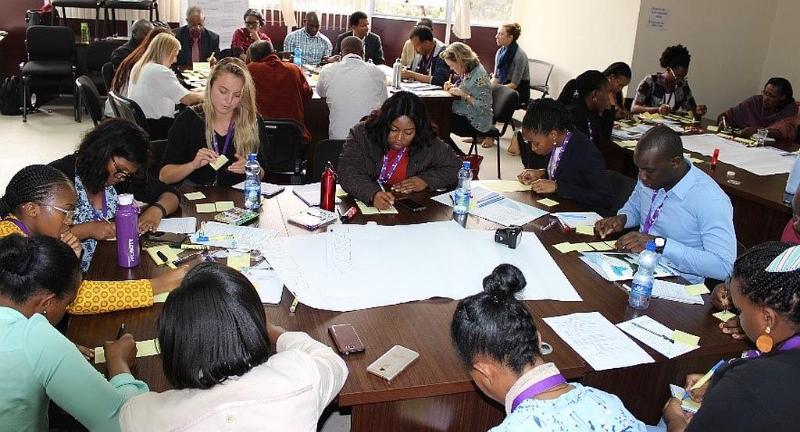
Participants working on course activities.
Last Modified: Fri, 26 Jun 2020 13:07:38 SAST
Prof Tally Palmer and Dr Jane Tanner travelled to Newcastle University to attend the H7O Global Water Security Symposium from 23-24 January 2020. The UKRI GCRF Water Security and Sustainable Development Hub invited Prof Tally Palmer to present a Plenary Paper at the Symposium. The paper was entitled: A learning journey of research, policy and practice, the pathway to the Adaptive Systemic Approach.
On 22 January, Dr Walsh convened and chaired the first N8-Water CoE colloquium: Developmental research as catalyst of change towards social-ecological justice. There were 14 delegates present, and 14 participants from five nodes engaged virtually. After a discussion of the ethical implications of developmental research, participants were grouped into three separate virtual discussions for an hour to pursue a discussion of research interests, before returning to the plenary. The CoE has agreed that such Colloquia will become a regular feature of N8 Water CoE collaboration.
The N8 Universities have agreed to make funding available for N8 researchers to collaborate with Water CoE capacity development and research. As a result, four UK researchers travelled to Ethiopia in February 2020 to participate in the first CoE Capacity Development training course.
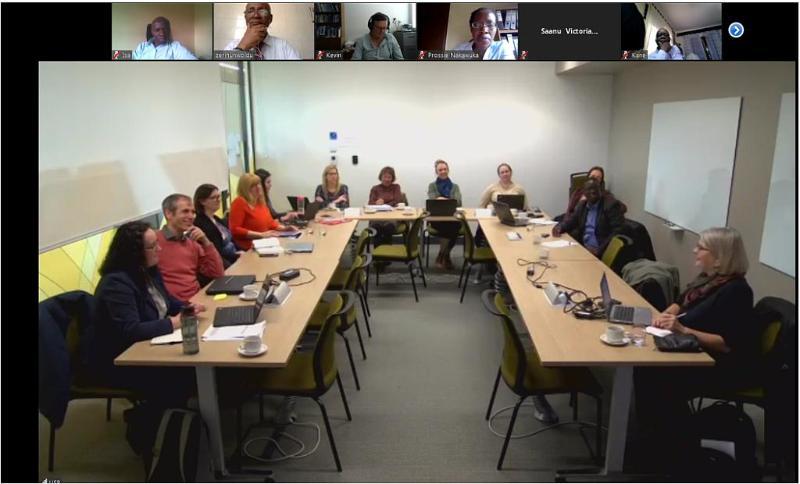
A screen shot of N8 and Water CoE researchers engaging face-to-face and virtually on 22 January 2020
Last Modified: Fri, 26 Jun 2020 13:07:38 SAST
The Water CoE was well represented at the Second ARUA Biennial Conference held in Nairobi, Kenya. The conference was themed ‘Africa and the Fourth Industrial Revolution: Defining a Role for Research Universities’ and was hosted by the University of Nairobi. The Water CoE hosted an early career research workshop on Systems Thinking, focussed on land and water and the Sustainable Development Goals. A conference session on Water was organised by the CoE and Drs Jane Tanner and Isa Kabenge and Prof Serigne Faye presented papers. Prof Tally Palmer presented as part of a panel during the closing session of the conference.
The Water session included presentation by Dr Jane Tanner (IWR, Rhodes University) on Water Resources Assessment Uncertainty in Africa and the Promise of Global Datasets. Dr Isa Kabenge (Makarere University, Uganda) presented on Big Data and Cloud Computing in Water Resources Management focusing on a Case Study on Land-Use Change in Planted Forests. Prof Serigne Faye (UCAD, Senegal) presented on the Value of Bibliometric Methods to Track and Assess High Impact Research in African Soil and Water Literature.
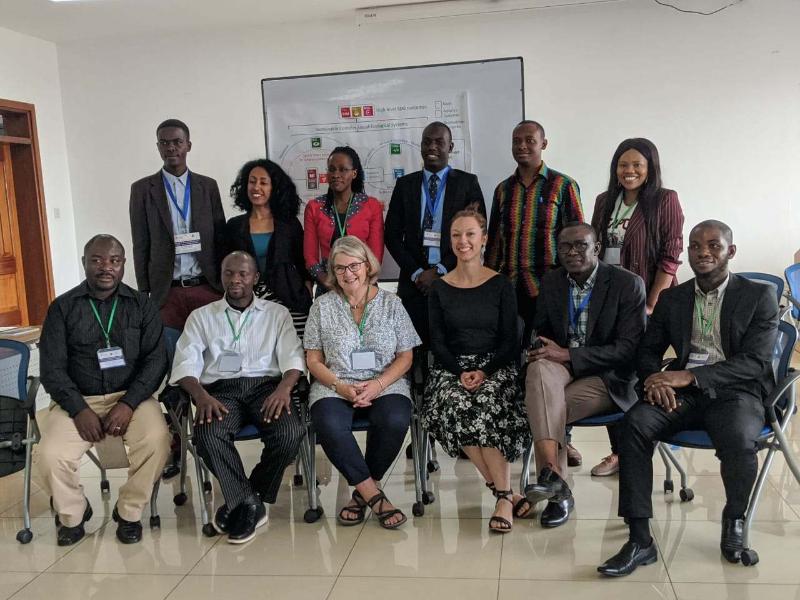
Water CoE representatives at the conference including 6 Early Career Researchers from the Centre partner institutions.
There were 18 participants who attended the CoE workshop on Systems Thinking, and the workshop materials (creative SDG images) were designed by the Environmental Learning Research Centre (ELRC), Rhodes University.
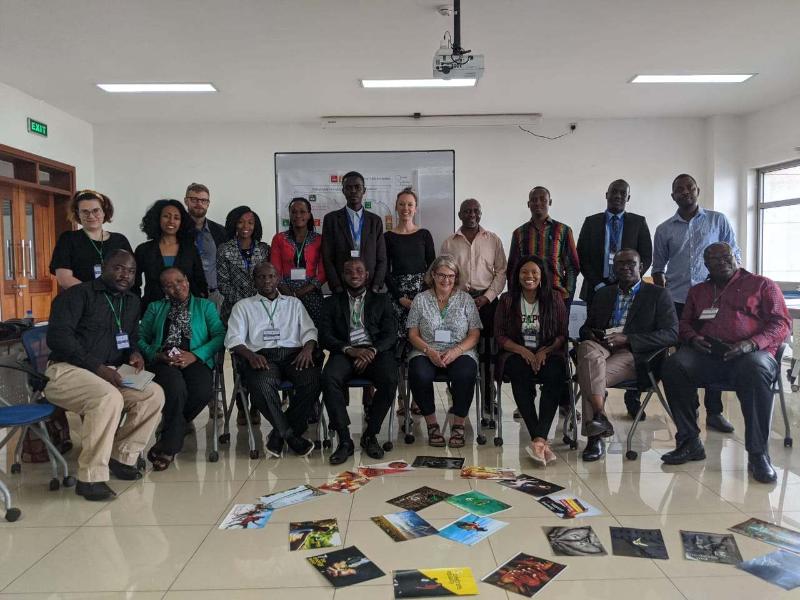
Water CoE workshop: All participants
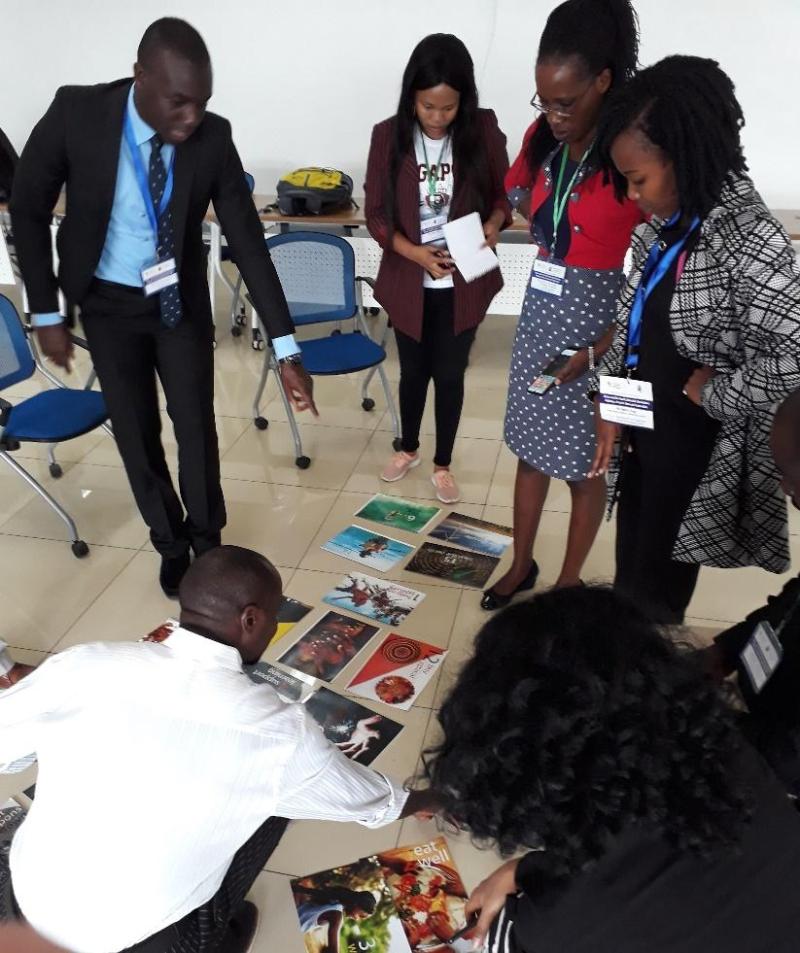
Water CoE workshop: Participants build a systemic picture of the SDGs
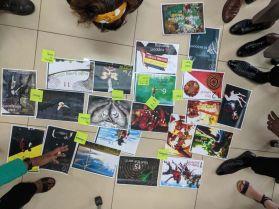
Water CoE workshop: ELRC materials being used in the workshop
Last Modified: Fri, 26 Jun 2020 13:07:38 SAST

In early 2019, the Water CoE and partners developed a proposal for a UK Research and Innovation (UKRI) Global Challenges Research Fund (GCRF) Capability Grant entitled Water for African SDGs. This was successfully awarded and the grant commenced in August 2019 with the aim to establish and develop the ARUA Water CoE as an effective, high-performance, hub and network of 8 African Universities’ researchers and post-graduate students. The CoE will use research to catalyse change towards social and ecological justice and sustainability, paying attention to African community water and sanitation needs.

The project team brings together diverse strengths in the area of water, so the nodes can flexibly link and respond innovatively to research funding calls, and effectively apply research. The Capability Grant proposal includes capacity-building, exchanges and mentorship and this was envisioned through the development and delivery of courses by each node, as well as skill transfer grants. However, the changed COVID-19 situation across the world since the project was submitted for funding, has put most travel to a halt. This will impact on the delivery of the planned courses for the next 2.5 years. Thus, we have conceptualised a shift in the delivery of the project through transferring of in-person courses to online courses, either as open courses or as Massive Open Online Courses (MOOCs). This alternative way of delivery of courses will not only build the capacity of the nodes but will additionally leave behind a legacy for future learners using case studies and contexts from Africa.
The Water CoE has developed a systemic image of the SDGs as a planning, practice and evaluation tool. The image has SDG 6, Clean water and sanitation, at the centre, linking two primary water cycles: i) Water in a Catchment (rainfall, run-off, ground water recharge, evapotranspiration, evaporation); and ii) Water Services – supply and sanitation (raw water from the natural resource, often in dams, pipes and pumps to water treatment works, treated potable water to households, waste water to treatment works and discharge into the natural resource). Each CoE node has strengths in different parts of these cycles for effectively applying research.
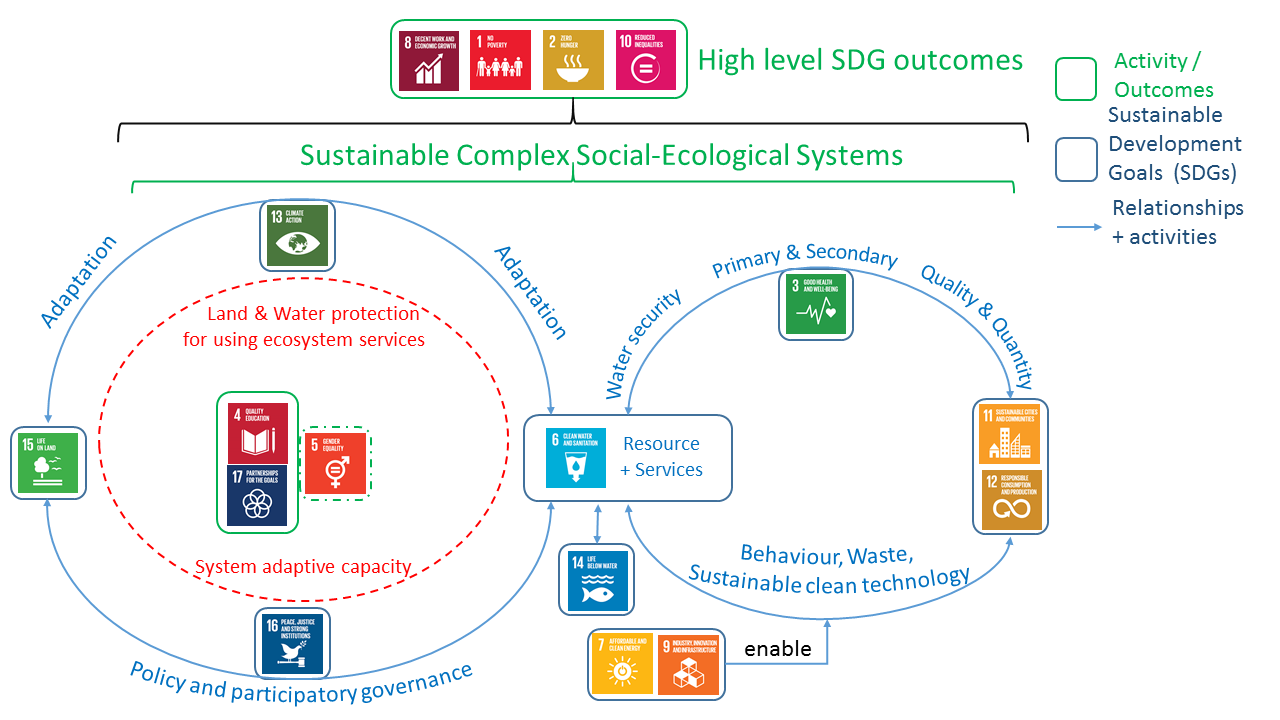
Last Modified: Tue, 03 Nov 2020 15:17:47 SAST
The CoE was formally launched by Dr Ernest Aryeetey, ARUA Secretary General, at an event hosted by Rhodes University Vice Chancellor, Dr Sizwe Mabizela on 27th May 2019. The launch was part of an Inception workshop 26-30 May 2019, where eight of the CoE nodes were represented and a strong, vibrant network emerged from the process (UKZN joined in 2020). We collectively agreed on the CoE name, research focus and direction, principles of collaboration, and began the process of building a directory of CoE researchers and their expertise.
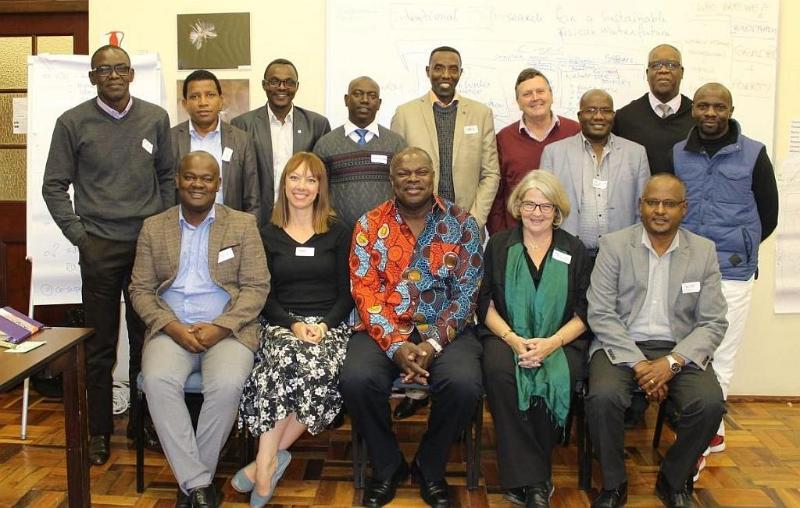
Water Centre of Excellence delegates at the Inception workshop, with ARUA Secretary General Professor Ernest Aryeetey. (Top from left: Professor Serigne Faye (U Cheikh Anta Diop), Professor Joel Norbert (U Dar es Salaam), Dr David Mfitumukiza (Makerere U), Dr Nsengimana Venuste (U Rwanda); Dr Christian Sekomo (U Rwanda); Dr Kevin Winter (UCT), Dr Deogratias Mulungu (U Dar es Salaam); Professor Alioune Kane (U Senegal); Dr Isa Kabenge (Makerere U). Front from left Professor Noble Banadda (Makerere U), Dr Jane Tanner (Rhodes U) Professor Ernest Aryeetey, Professor Tally Palmer (Rhodes U), Dr Tena Alamirew (U Addis Ababa). Delegates from the University of Lagos (Prof Ezechiel Longe and Dr James Akanmu) joined later.

CoE partners workshopping their vision of the CoE.
From Left: Professor Ernest Aryeetey (Secretary-General of ARUA), Dr Christian Sekomo (U Rwanda, Rwanda), Professor Alioune Kane (U Cheikh Anta Diop, Senegal), Dr Kevin Winter (U Cape Town), Dr Tena Alamirew (U Addis Ababa, Ethiopia), Prof Ezechiel Longe (U Lagos, Nigeria), Professor Serigne Faye (U Cheikh Anta Diop, Senegal), Dr Deogratias Mulungu (U Dar es Salaam, Tanzania), Dr Jane Tanner (Rhodes U, South Africa), Professor Joel Norbert (U Dar es Salaam, Tanzania), Dr James Akanmu (U Lagos, Nigeria), Dr Nsengimana Venuste (U Rwanda, Rwanda), Dr David Mfitumukiza (Makerere U, Uganda), Dr Isa Kabenge (Makerere U, Uganda), Professor Noble Banadda (Makerere U, Uganda), Professor Tally Palmer (Rhodes U, South Africa)
Last Modified: Fri, 26 Jun 2020 13:07:38 SAST